




APR 29NOV 23






APR 29NOV 23
Our weekly mobile farmer’s market selling fresh, local, affordable fruits and vegetables on a sliding scale. 50% off with SNAP/EBT
HIGHLAND PARK
TUES WED
SENIOR APARTMENTS
1221 E Brookland Park Blvd 11:00 – 12:30PM
VCU MASSEY CANCER CENTER
1001 E Leigh Street 10:00AM – 12:00PM (for patients and families)
BON SECOURS CAREA-VAN RAMSEY MEMORIAL UMC
5900 Hull Street Rd N 10:00am – 11:30pm
WINCHESTER GREENS
2700 Bensley Commons Blvd 11:30 – 1:00pm
RVA BLACK FARMERS MARKET
DOMINION PLACE SENIOR APARTMENTS
1025 W Grace Street 1:30 – 3:00PM
BON SECOURS SARAH GARLAND JONES CENTER
2600 Nine Mile Rd 12:30 – 2:00PM
BROAD ROCK PUBLIC LIBRARY
4820 Old Warwick Rd 11:00am – 12:30pm
BHC LINCOLN MEWS APARTMENTS 4101 North Ave 4:00 – 6:00PM
MANCHESTER YMCA 7540 Hull Street 4:00 – 6:00pm
STONEWALL SENIOR APARTMENTS 1920 Stonewall Ave 1:00 – 2:30pm
NEIGHBORHOOD RESOURCE CENTER (FULTON) 1519 Williamsburg Rd 4:00 – 6:00pm
BROAD ROCK ELEMENTARY SCHOOL
4615 Ferguson Lane 2:00pm – 3:30pm
2nd & 4th Sunday 1311 Westwood Ave 11:00AM - 3:00PM JUNE 8TH & 22ND
*No markets : Thursday, June 19, Friday, July 4, Saturday, July 5, Monday, July 28- Thursday, July 31, Friday, August 1


@shalomfarms All produce from our farms is Certified Naturally Grown.

Cash, Cards, and SNAP/EBT accepted.
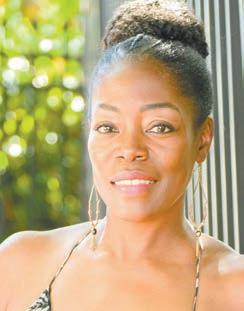
Regina Hall Rudolph, Publisher
This is my first Father’s Day without my stepfather—and the weight of that reality is hard to put into words. He wasn’t just a father figure; he was a builder of lives, of cities, of quiet legacies. As I reflect upon our Men’s Issue this month, I realize just how much he shaped the path I walk today in health, wellness and intentional living—even if I didn’t see it clearly at the time.
He was always in motion—running marathons, playing tennis, swinging a softball bat or bowling competitively on a national level. And when he wasn’t in motion recreationally, he was building. As a master bricklayer, there wasn’t a street we’d drive down where he wouldn’t point and say, “I helped build that.” Half of Richmond, quite literally, has his fingerprint on it.
He also made choices that were ahead of his time. A pescatarian since the early ‘80s, he taught me, simply through example, the value of discipline and consciousness about what we put into our bodies. He never smoked. He didn’t drink. He moved his body daily and lived with care. Looking back, I see now that he was modeling something profound: selfrespect, consistency and wellness in action.
Yet, despite his clean lifestyle, he passed away from lung cancer—likely due to prolonged exposure to chemicals in the construction industry. It’s a sobering reminder that even the strongest among us are vulnerable to the environments we work and live in.
His legacy lives on, not just in the buildings he helped create, but in the way I now lead my life and in the lives of his grandchildren who carry his strength, spirit and quiet wisdom forward. As a publisher, herbalist and wellness advocate, I find myself drawing from the seeds he unknowingly planted in me decades ago.
Publisher Regina Hall Rudolph
Editors Tammie Jones Randy Kambic Martin Miron
Design & Production Patrick Floresca
US
12220 Chattanooga Plaza, Suite 122 Midlothian, VA 23112 804-495-0325
Regina@NARichmond.com NARichmond.com

Natural Awakenings Richmond

Our June edition is dedicated to the men who lead with quiet strength, who care for themselves and others, and who leave their mark, not with loud declarations, but with brick-by-brick consistency. I hope our magazine reminds you to honor the fathers and father figures in your life and to live each day with the same intention, vitality and love that my stepfather showed so effortlessly.
With deep gratitude, Regina
Facebook is a registered trademark of Facebook, Inc.
SUBSCRIPTIONS
Subscriptions are available by sending $12 (for 6 issues) to the above address.
CEO Kimberly B. Whittle
COO Michael Bevilacqua
CMO Vee Banionis
Sr. VP Operations Brian Stenzler, DC
National Editor Sandra Yeyati
Editor Brooke Goode
Copy Editor Melanie Rankin
Print Production Specialist Kevin Rankin
Design Director Agnes Mazeikaite
Production Flip180
Customer Service Dani Bucad
US
Natural Awakenings Publishing Corporation 350 Main Street, Suite 9B Bedminster, NJ 07921 Ph: 239-206-2000
NaturalAwakenings@KnoWEwell.com
Cover image by Askari Shujaa
© 2025 by Natural Awakenings. All rights reserved. Although some parts of this publication may be reproduced and reprinted, we require that prior permission be obtained in writing. Natural Awakenings is a free publication distributed locally and is supported by our advertisers. Please call to find a location near you or if you would like copies placed at your business. We do not necessarily endorse the views expressed in the articles and advertisements, nor are we responsible for the products and services advertised. Check with a healthcare professional regarding the appropriate use of any treatment.

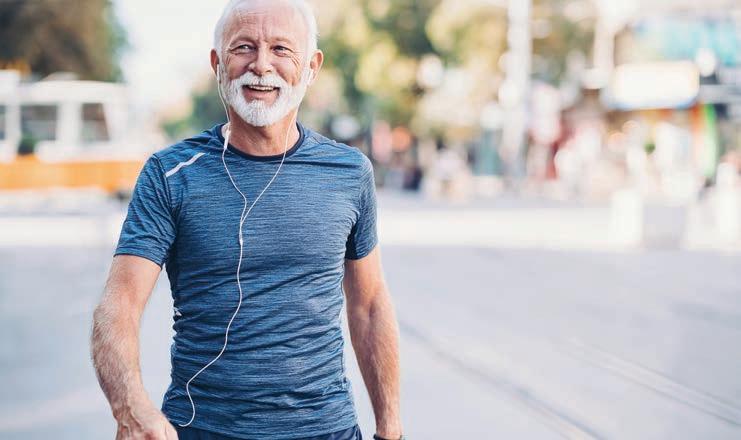


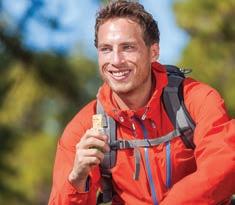

Science on a Saturday excursions, hosted by the James River Association from 8 a.m. to noon, June 28, at the Jordan Point Marina, invite curious minds of all ages to climb aboard the Spirit of the James, a 40foot pontoon boat designed for immersive, hands-on learning about the river’s ecosystem and health.
Each two-hour round trip features a unique science lesson led by the association’s education staff, providing in-depth insights into the current state of the river, the impact of conservation efforts and how citizens can play a role in protecting this vital waterway. The experience is perfect for families, friend groups and anyone else that loves the outdoors and wants to deepen their connection to nature.
Location: 101 Jordan Point Rd., Hopewell. For reservations and more information, visit TheJamesRiver.org.
Capital Area Health Network (CAHN) is launching a Join-theFight! men’s health initiative from 10:30 a.m. to 3:30 p.m., June 14, at Midtown Green. This powerful new effort aimed at encouraging men across our region to become proactive about their health and wellness is designed to inspire, motivate and equip them with the resources, education and tools needed to take charge of their health journey.
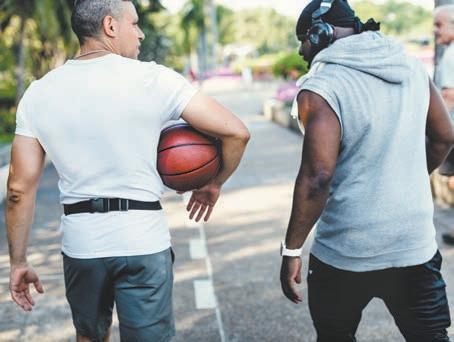
From preventive screenings to practical lifestyle support, the initiative brings together a variety of services in one place. Attendees can meet with Massey Cancer Center team members and gain access to valuable resources that include cancer screening information and personalized guidelines; cancer patient navigators to help overcome barriers to care; “We Can Eat Well,” providing cost-saving healthy shopping strategies and meal planning; and “We Can Quit,” a free smoking cessation program featuring trained quit coaches.
Location: 2230 W. Broad St., Ste. 201, Richmond. For more information, call 804-628-0896 or email EngageMassey@vcu.edu.
The 13th annual Boxer Brief 5K Run/Walk from 8 to 10 a.m., June 7, at City Stadium, will bring together colorectal cancer survivors, patients, families, friends and advocates to take a stand against one of the most common and preventable cancers in the U.S. Proceeds from the event support Hitting Cancer Below the Belt (HCB2) and their vital work in providing screening and educational services throughout the community.
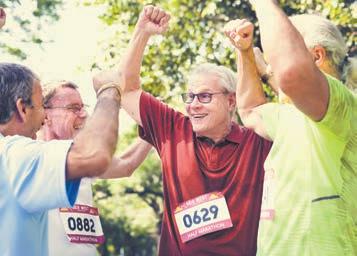
Attendees can meet team members from the VCU Massey Cancer Center and access resources including cancer screening guidelines and information; patient navigators to help address barriers to care; “We Can Eat Well” nutrition tips, budget-friendly shopping and meal planning; and “We Can Quit” free smoking cessation support with trained quit coaches.
Colorectal cancer is the leading cancer killer in men under 50 and the second deadliest cancer overall. Individuals can also participate in the global virtual challenge during the weekend of June 7 and 8. Walk, run, ride, swim, paddle or even dink (pickleball), because every mile matters.
Location: 3201 Maplewood Ave., Richmond. Register at RunSignup.com/Race/Info/VA/ Richmond/BoxerBrief5K. For more information, call 804-628-0896.

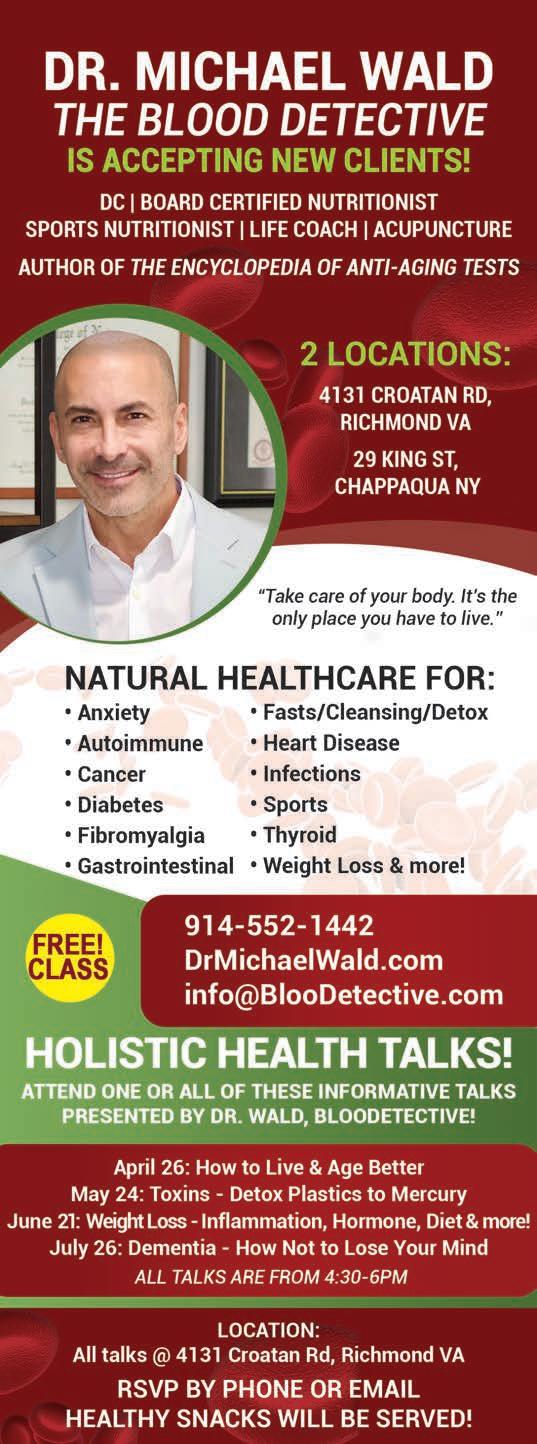
Approximately 3 million Americans receive dental implant procedures annually. Unlike natural teeth, implants do not form a seamless seal with the surrounding gum tissue, posing a potential risk of infection. Researchers at the University of Pennsylvania are working to develop a new implant that mitigates this concern via a twofold defense.
The first defense involves creating the crown to include antimicrobial compounds, currently barium titanate, to effectively combat bacterial growth.
The second line of defense entails embedding light-emitting diodes (LEDs) onto the base of the crown to deliver immune-boosting, red-light therapy to the surrounding gum area. To eliminate the need for a battery, the implant generates its own electricity via the crown’s specialized material, such as the barium titanate, which converts motion—such as chewing—to electrical energy. Although barium titanate is not as strong as the materials currently used for implants, the research team is working on enhancing its properties. The product will be tested in pigs in 2025, paving the way for human trials.
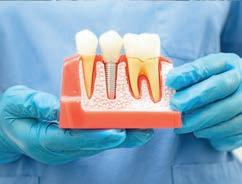
Suddenly feeling old may not be our imagination. A recent study published in Nature Aging examined the molecular changes of 108 adults between the ages of 25 and 75. The participants were tracked for a median of 1.7 years, with a maximum of 6.8 years, during which biological samples were collected and evaluated every three to six months from a range of sources, including the blood, stool, skin, mouth and nasal passages.
The researchers compared the samples obtained from participants at different ages and observed that people seemed to age more rapidly at age 44 and again at age 60. The changes at age 44 were mostly related to fat and alcohol metabolism, as well as an elevated risk of cardiovascular disease. The changes at age 60 related mostly to immune dysfunction and carbohydrate metabolism. According to Stanford Medicine Professor Michael Snyder, these findings might explain why people seem to have more trouble processing alcohol starting in their 40s and become more prone to illness in their 60s.

by Dr. Adina Silvestri, Ed.D., LPC
On the surface, many men appear to be thriving; maintaining careers, showing up for their families and staying active. But behind the scenes, a growing number are quietly battling a form of depression that is often overlooked. Known as covert depression, this condition does not always fit the traditional image. Instead of sadness or withdrawal, it may present as chronic irritability, perfectionism, emotional numbness or escape into work, substances or digital distractions. Men experiencing covert depression are often high-functioning, but feel increasingly disconnected from themselves and others
Unlike more visible forms, covert depression can persist undetected for years. Its signs, such as anger outbursts, apathy or emotional detachment, are often misinterpreted or minimized, and many men do not recognize these experiences as symptoms of a deeper mental health struggle. Common issues may include chronic irritability or anger; workaholism or perfectionism; emotional withdrawal from loved ones; escapism through substances, screens or sex; a persistent sense of numbness; and both masculinity and emotional suppression.

Contributing to the issue is a cultural narrative that discourages vulnerability in men. From an early age, boys are conditioned to value strength, stoicism and control. Emotions such as sadness, fear or grief are often suppressed, with little room for safe expression. Over time, this can lead to internalized distress that manifests in indirect or masked ways.
Mental health professionals that specialize in treating men with covert depression note that these behaviors are not character flaws, but coping mechanisms—often unconscious attempts to manage pain or avoid emotional overwhelm. In this context, irritability, withdrawal or workaholism may be protective responses rather than signs of personal failure. These patterns are often misunderstood, but they serve a purpose; helping individuals function in a world where emotional expression, especially among men, is often stigmatized or dismissed.
Healing from covert depression often begins with acknowledging the struggle and creating space for curiosity and compassion. Therapeutic approaches such as Internal Family Systems, Brainspotting and Ketamine-assisted therapy are increasingly used to help men process difficult emotions and reconnect with parts of themselves that have long been silenced.
Men’s therapy groups are another emerging resource offering supportive environments where participants can lower emotional defenses and build authentic connections without judgment. These spaces prioritize emotional safety and encourage exploration of vulnerability, often for the first time in a man’s life. Covert depression does not always require a dramatic breakdown to be addressed. In fact, early intervention can help prevent years of silent suffering. For men that feel numb, stuck or emotionally overwhelmed, the path forward may begin by asking simple, but powerful ques-tions such as, “What am I really feeling? What am I carrying alone?”
For more information about men’s groups and therapy services, including a “What Mask Are You Wearing?” quiz designed to help individuals explore the ways they may be hiding in plain sight, visit AdinaSilvestri.com.
Over the last 20 years, men’s daily use of personal care products has nearly doubled, according to the Environmental Working Group. Men apply shaving cream to their face, splash on cologne, shower with body wash, style their hair with wax and use strong antiperspirants without realizing that they might be exposing themselves to a host of toxins.
The most prevalent health culprits are hormone-disrupting phthalates and fragrance extenders that have been shown to inhibit testosterone levels and reduce sperm count. Preservatives such as formaldehyde, known to cause cancer, are also commonly used.
The effects of grooming routines extend beyond the individual because fossil fuels are expended to transport these products and discarded plastic containers accumulate in landfills, eventually degrading into microplastics that pollute waterways and contaminate the human food supply.
To mitigate these adverse effects on human and planetary health, consider using the following eco-friendly, organic and cruelty-free products.
• Reusable safety razors crafted from bamboo or metal and fitted with recyclable metal blades provide a close shave without contributing to the 2 billion disposable razors that end up in landfills every year and take more than a century to biodegrade.
• Electric shavers are reusable, reduce water use and have a lower carbon footprint than disposable razors.
• Sustainably sourced beard-softening oils such as jojoba, argon or meadowfoam are infused with organic and vegan botanics by companies such as Copper Johns.
• Aluminum-free deodorants maintain freshness throughout

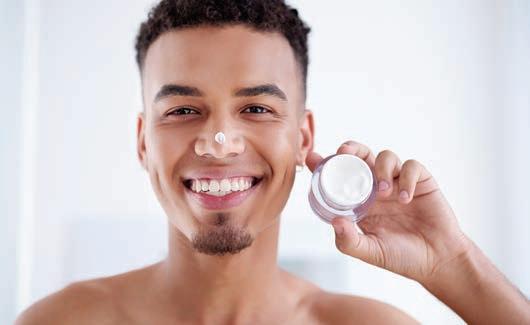
the day using bacteria-fighting activated charcoal, natural clays and botanical additions like coriander. Antiperspirants that inhibit perspiration by blocking pores with aluminum-based ingredients should be avoided.
• Natural body washes and soaps with ingredients such as Jimmy Red corn, coconut oil and kaolin clay gently clean pores and smooth the skin without employing drying agents. Choose products packaged in natural materials.
• Chemical-free colognes with natural fragrances derived from essential oils, herbs and spices can be alluring without being overpowering. Some use organic sugarcane alcohol. Noteworthy brands are Dr. Squatch, Henry Rose and unisex fragrances by Heretic.
• Natural shaving creams formulated with skin-nourishing ingredients such as coconut-derived surfactants, vegetable glycerin, aloe, vitamin E and botanicals provide a close shave, even for sensitive skin.
• Chemical-free shampoos employ sulfate-free cleaning agents and natural botanicals to nourish the hair. Additionally, zinc and botanical additions like sage and tea tree oil are incorporated to address scalp and dandruff concerns.
• Hair waxes and pomades should not contain petroleum. Look for ingredients like strong-hold beeswax, or simply choose a water-based product.
by Askari Shujaa
Long COVID, the extended, post-pandemic form of the pandemic COVID-19 virus, presents itself differently in every individual it touches. For some, the changes are subtle and gradual, but for others, the effects may be severe, persistent and life-altering. It remains without a universal definition, a reliable diagnostic test or confirmed treatment plan. What unites many living with this condition is not just the shared symptoms, but the ongoing process of reclaiming life, one mindful breath at a time.

and self-compassion is nearly universal. While some are no longer able to work or engage in prior activities, others find creative ways to stay connected to their passions, even if on a smaller scale.
Many people that contracted COVID-19 expected a short illness followed by a full recovery. However, for a significant number, the virus had other plans. After the initial infection was re-solved, a range of symptoms lingered such as fatigue, muscle and joint pain, shortness of breath, insomnia, brain fog, dizziness and digestive issues, among others. Weeks turned into months, and for some, years. While certain symptoms faded over time, others persisted or evolved, reshaping daily routines and personal identities. Living with Long COVID became less about recovery and more about adaptation—learning how to navigate a new, uncertain normal.
This often means managing limited energy, chronic pain and cognitive changes. Everyday tasks once taken for granted now require careful planning, pacing and rest. Many report that they must budget their energy throughout the day to avoid flareups or crashes. The experience is different for everyone, but the need for awareness, patience
Beyond the physical symptoms, Long COVID can take a serious emotional and mental toll. Feelings of isolation, confusion and grief are common, especially when symptoms are misunderstood, minimized or dismissed by others, including medical professionals. Early in the pandemic, the term “long-hauler” wasn’t even part of the conversation. Many felt alone in navigating a condition with no road map. For some, the turning point comes with a decision to shift perspective and move from frustration to self-advocacy—from despair to hope. Choosing love, compassion and acceptance as guiding principles helps them begin to rebuild from a place of strength, rather than fear.
With limited solutions coming from conventional medicine, many individuals turn to holistic prac-tices for support. Modalities such as qigong, tai chi, yoga, breathwork, meditation, acupuncture and herbal remedies have become powerful tools for managing inflammation, pain, anxiety and fatigue. These practices often serve the dual purpose of both providing both physical relief and spiritual grounding. Rather than striving for a return to their old self, those on the healing journey often focus on honoring the body’s current capacity and finding joy in the present moment. Healing becomes less about a destination and more about a relationship with the self, the body and life as it is.
Experiences with healthcare providers vary widely. While some practitioners offer empathy and support, others struggle to acknowledge or understand the complexity of Long COVID. Many people are left to advocate for themselves by becoming experts in their own care through trial, research and community support. This lack of clarity can be disheartening, but it has also prompted a broader shift in how individuals define healing. It is no longer only about eliminating symptoms, but also reclaiming agency, finding purpose and making peace with what is.
Healing from Long COVID is rarely linear. It may involve periods of improvement followed by setbacks, and often requires adjusting expectations. But healing is also a mindset. It is about showing up for life with what is available in the moment and finding value, beauty and meaning in new ways. While Long COVID may limit the body, it does not have to limit the spirit. Many that live with this condition find new depths of resilience, creativity and connection, both with themselves and with others walking similar paths.
Those new to this experience should know that it is okay to grieve and even feel overwhelmed because these emotions are part of the process. But this can also be a beginning— a chance to rebuild a life that is softer, slower and more intentional. Motivated individuals can advocate for their personal health, seek out community and explore tools that resonate within such as breathwork, therapy, journaling, spiritual practice or integrative care, and above all, embrace grace, because healing looks different for everyone.
Askari Shujaa is an advocate for Long COVID awareness.
by Carrie Jackson
While many people seek to prolong life, those extra years will not be fulfilling without good health. “The United States has one of the worst healthspans in the world. We have the highest rate of chronic disease and spend too much time suffering and deteriorating,” declares Dr. Eric Plasker, a chiropractor and creator of The 100 Year Lifestyle, an instructional manual and wellness system for making the most of an extended lifespan.
According to Plasker, “How you take care of yourself every day has a direct effect on your long-term quality of life. Unfortunately, the current healthcare system has focused mostly on symptoms and disease treatment. We need to have more of a lifestyle-care approach to help you function at your highest level for a lifetime, instead of constantly trying to get your health back.”
Dr. Peter Diamandis is a physician, engineer, entrepreneur and co-founder of the BOLD Longevity Growth Fund, which invests in biotechnologies that address the root causes of disease and extend healthspan. He is also the co-founder and chairman of Fountain Life, a company that focuses on advanced diagnostics and preventative health to help people live longer and healthier lives.
Diamandis asserts that people possess greater control over their healthspan than they may think. “We’re at a turning point in health care—shifting from a reactive, one-
size-fits-all model to a proactive, personalized and data-driven approach,” he remarks. “While many people assume their longevity is mostly genetic, the data tells a different story. Studies involving tens of millions of people show that your genes account for only 7 to 30 percent of how long you live. That means the rest is up to you—your lifestyle, your environment and what you eat.”
The impact of food on our well-being cannot be underestimated, and Diamandis points out that food can be either the slowest form of poison or the most powerful medicine. In a nutshell, our daily meal choices put us in control of how we age. He recommends anti-inflammatory foods such as broccoli, spinach, Brussels sprouts, blueberries, walnuts, chia seeds and avocado.
“I eat the rainbow every day, because flavonoids, carotenoids and polyphenols act as molecular defenders, protecting your DNA, supporting your mitochondria and reducing your risk of conditions like heart disease, cancer and neurodegeneration,” he states. “I also use extra-virgin olive oil and turmeric liberally, which have both been shown to reduce inflammation at the cellular level. And I keep snacks like frozen blueberries and raw walnuts within arm’s reach, because what you actually eat is what you have close by.”
Avoiding harmful foods is just as important. “Sugar is incredibly inflammatory. It shrinks the hippocampus, disrupts metabolism and fuels conditions like diabetes and Alzheimer’s. Most people don’t realize how addictive it is or how much damage it causes until they cut it out and feel the difference,” says Diamandis.
Integrating modalities such as chiropractic care, acupuncture, yoga and meditation into a wellness plan can help our bodies function at an optimum level. Plasker notes that the number, intensity and duration of chiropractic treatments vary based on a patient’s baseline health. “If you are meditating five times a day and have no underlying decay, you will need a lot less lifestyle care than if you are a weekend warrior or a marathoner who might have more decay," he explains.
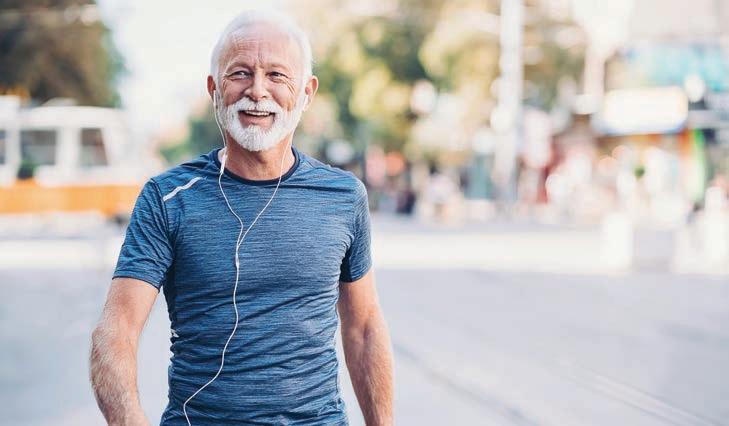
While chiropractic care is well known for success with back and nerve pain, its hidden specialty is in functional and performance-based care. “Physical therapy, functional medicine and nutrition therapy work better with the addition of chiropractic care,” asserts Plasker. “It helps to align the spine so the nervous system can communicate between the brain and body the way it is supposed to.”
As we age, we may encounter ongoing consequences from the wear and tear that occurred in our younger days. “The pounding and collisions from youth sports can have a lasting effect on the body and can accelerate osteoarthritis,” Plasker points out. “Regular chiropractic adjustments help to restore alignment, balance, motion and function, so the body doesn’t continue to deteriorate. Anti-inflammatory supplements such as turmeric, glucosamine and chondroitin can help with acute inflammation, but if the alignment of the spine isn’t right, they’ll be facing a constant battle.”
Reframing fitness routines to prioritize long-term sustainability can help the body repair previous damage. “If you were an athlete, you can still be an athlete, but you might have to change your approach,” suggests Plasker. “Align the care you receive with the lifestyle you are choosing to live. If you’re going to train for triathlons, you need to eat healthy and stretch more. You need to increase your supplementation and the frequency of your chiropractic adjustments. But if you’re just going for hikes and power walks, you’ll need less lifestyle care. It depends on you and what you want.”
Holistic stress management is essential for longevity and overall wellness. “A nervous system that is always in fight-or-flight mode can lead to inflammation, burnout and elevated blood pressure, putting undue stress on the heart,” explains Plasker. “Chiropractic intervention, coupled with tools such as aromatherapy and meditation, can create peace for the nervous
system so you can use your energy for other things.”
Lisa Faremouth Weber, the owner of Heaven Meets Earth Family Yoga Studio, in Evanston, Illinois, notes that practices such as crystal bowl sound healing, yoga and mindfulness can help calm the body and contribute to overall wellness and longevity. She also points out that there is considerable scientific evidence that supports the health benefits of practicing yoga, meditation, tai chi and qigong.
“Yoga and other complementary mind/ body approaches integrate an individual’s physical, mental and spiritual components to improve cardiorespiratory health, physical and mental health and stress-related illnesses,” she explains. “Dr. Dean Ornish introduced millions to yoga’s health benefits through his published studies, which demonstrated that heart disease can be reversed through diet, meditation, group support and yoga. Additionally, ancient texts such as the Upanishads or Patanjali’s Yoga Sutras teach that the body follows the mind, and the mind follows the breath. Breath awareness and breathwork cultivate a balanced, harmonious and equanimous mind, enabling clarity and focus.”
Being mindful of daily habits and wellness routines in the present moment can lead to an extended healthspan down the road. “The goal isn’t just to live longer; it’s to stay healthy long enough to ride the wave of breakthroughs coming over the next decade and reach what we call ‘longevity escape velocity’. That’s the moment when, for every year you live, science can extend your life by more than a year,” explains Diamandis. “We’re not far off. And the choices you make today—using data-driven diagnostics, embracing functional medicine and sticking to lifestyle habits that work—are what will get you there.”
Carrie Jackson is a Chicago-based freelance writer and frequent contributor to Natural Awakenings. Connect at CarrieJacksonWrites.com.
by Carrie Jackson
We have a finite number of hours in the day, and worrying about things that are out of our control can take up time that could be used for more productive and fulfilling things. “There are some activities that universally charge us up or deplete us. For example, most people are energized by quality time with family and friends or by reading a good book. On the other hand, universal energy drainers include overworking, overeating, drinking too much alcohol and taking drugs,” says Dr. Eric Plasker, founder of The 100 Year Lifestyle, an instructional manual and wellness system for making the most of an extended lifespan.
He recommends taking a personal energy inventory. Make a list of the foods, hobbies, habits and people in daily life. Then make note of the things that either drain or inspire energy throughout the day. Do not think of energy drainers as problems that need to be eliminated. Rather, the list is a way to raise awareness about where energy is going and how to get it flowing positively by turning drainers into gainers. For example, if driving in traffic elicits anger, adjust the travel schedule or put on relaxing music and do deep breathing exercises to shift into a more positive state.

by Marlaina Donato
Gardeners have long understood that getting their hands in the earth makes them feel better, and scientific research supports this belief. Studies of the soil-dwelling bacterium Mycobacterium vaccae have linked the practice to improved mood, as well as reduced stress and anxiety, because it can trigger the release of serotonin. Other reported benefits include anti-inflammatory and immunoregulatory properties, relief from skin allergies and reduced lung cancer-related nausea and pain.
Data researchers at Statista report that a mere 8 percent of our lives is spent outdoors, leading to what author Richard Louv calls nature-deficit disorder, a phenomenon that compromises the well-being of both children and adults. According to Pam Montgomery, author of Co-Creating
with Nature: Healing the Wound of Separation, “We are a part of nature, and yet, we have fallen into this deep amnesia where we have forgotten that we are kin to the tree, the river, the mountain and all of life. Being separated from the source of one’s sustenance creates a deep chronic level of stress, which affects us on all levels.”
Whether we nurture houseplants, capture seasonal outdoor photographs, doodle in a nature journal, plant patio flowers or simply stroll a local park, reconnecting with living organisms can bolster our immune system, enhance cognitive function and improve mental well-being.
A 2020 review published in Frontiers in Psychology shows that as little as 10 to 20 minutes of time spent in nature improved

the mental health of college-aged adults. Notably, being outdoors in urbanized settings did not yield comparable benefits. Furthermore, a 2019 study published in the International Journal of Environmental Research and Public Health revealed improved attention and focus among 23 students aged 11 to 13 years that studied with plants in the classroom.
“Our bodies evolved in the natural world, and, for many basic functions, we took our cues from the natural world—light levels, day length, plentifulness of resources. However, we now spend over 90 percent of our time in climate-controlled buildings with artificial light, so we are cut off from these cues,” says Cynthia McPherson Frantz, chair of the department of psychology at Oberlin College, in Ohio.
Montgomery concurs, noting, “Because we are constantly surrounded by artificial electro-magnetic fields (EMFs) like those of cell phones, computers and alternating current, instead of the natural EMFs of the forest, streams, Earth, ocean, birdsong, et cetera, our energy bodies become full of static, and we lose the ability to hear the messages and receive the ‘touches’ from nature.” For Montgomery, who maintains a shamanic partnership with the natural world, plants are conscious beings, and the Earth is calling us back into relationship, reciprocity and reverence.

Communing with nature among the redwoods was medicine for Ellen Dee Davidson, author of Sacred Forest Bathing: The Healing Power of Ancient Trees and Wild Places. “The main difference be tween forest bathing and an ordinary walk, hike or camping trip is the quality of attention we bring to the environment,” she explains. “By using our senses to focus on what we see, hear, smell, taste or touch, we become more present to our surroundings.”
Davidson attributes her recovery from fibromyalgia, chronic fa tigue, anxiety and insomnia to the therapeutic effects of spending time in the trees. “Part of why immersing ourselves in nature is so healing is that we can be alone but not alone. We are part of the entangled weave of life,” she shares.
In Japan, shinrin-yoku, or “taking in the forest atmosphere,” emphasizes spending time among trees and was officially incorporated into a national health program by the government in 1982. A 2022 study published in BMC Complementary Medicine and Therapies indicates that forest bathing reduced blood pressure and stress hormone levels among participants compared to other environments.
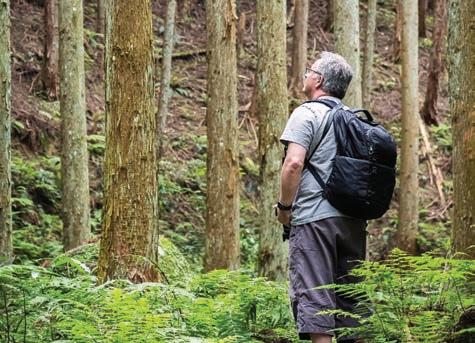

In a society where sensitivity is often seen as a liability, time spent with trees has taught Davidson how to protect her sensitive nature, giving herself permission to assert healthy boundaries and exercise self-compassion. She also advocates for mindful breathing exercises, noting, “We’re always connected to nature through our breath.”
Montgomery elaborates on the concept of reciprocal breathing, explaining, “We breathe in oxygen from the plants, trees and sea vegetables and breathe out carbon dioxide, which the plants absorb. So, the practice is to bring into your awareness a favorite plant or tree that you engage in reciprocal breathing with, becoming aware that you are the breath of another being.”
Frantz suggests that tapping into nature’s vitality can be as simple as finding a corner of nature to study and check in with every day. “This pocket of nature doesn’t have to be big,” she says. “It could be the squirrel that lives in the tree outside your window, or the tree itself.”
Marlaina Donato is an author and multimedia expressionist. Connect at WildflowersAndWoodSmoke.com.
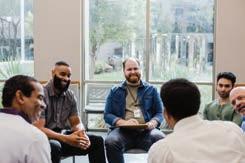

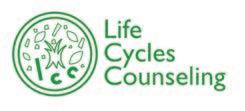
We create a space for men to be real, not perfect.
Specializing in brainspotting, IFS, and mind-body healing.
Break cycles. Rebuild confidence.
Men come feeling stuck— and leave with clarity.
adinasilvestri.com

by Zak Logan
Creatine has been a popular supplement for athletes looking to enhance performance and increase muscle mass, but more recently other proactive groups have taken notice. Biohackers, for example, see it as an aid in their quest to optimize well-being and extend their healthspan, while geroscientists that study the mechanisms of aging have identified creatine as a possible intervention to delay, treat or prevent age-related diseases.
A naturally occurring compound, creatine helps provide a steady energy supply to skeletal muscles, enabling them to contract and flex. It is also a vital contributor to numerous processes in the
body. According to Jon Nakasone, owner of Aloha Personal Training, in Honolulu, three amino acids—arginine, glycine and methionine—collaborate to facilitate the body’s production of creatine, which in turn plays a pivotal role in the production of adenosine triphosphate (ATP), the primary energy-carrying molecule in cells.
Most of the body’s biological processes rely on ATP for the conversion of glucose within cells. Nakasone also notes that creatine’s arginine is a precursor for the synthesis of nitric oxide, a molecule that can improve blood flow, which is especially important for men’s sexual function, as well as nutrient delivery to muscles.
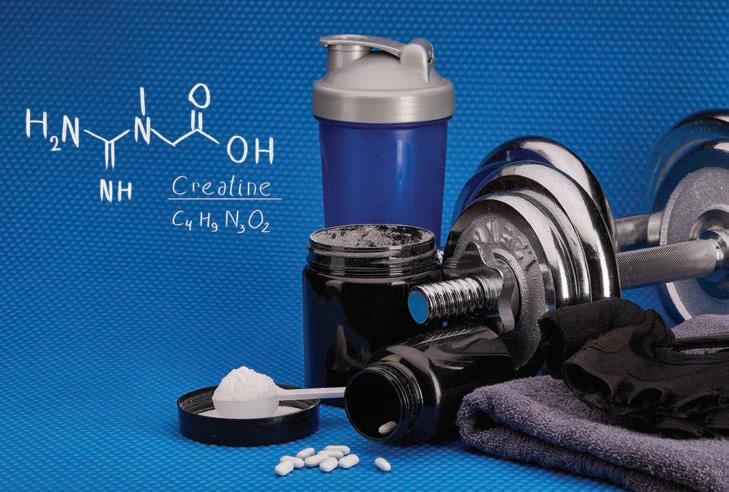
Approximately 95 percent of the body’s creatine is found in skeletal muscle as phosphocreatine, where it serves as a rapid energy source during high-intensity activities. While naturally produced by the body, creatine is also consumed as a dietary supplement to enhance athletic performance. Since the 1990s, some individuals have reported positive fitness gains when using creatine supplements.
A 2023 systematic review and meta-analysis published in Nutrients indicates that creatine supplementation combined with resistance training can significantly improve upper and lower-body muscle strength in healthy, middle-aged adults, compared with resistance training alone. Nakasone and his team propose a holistic approach to fitness, emphasizing exercise, a healthy diet and quality sleep. However, they assert that creatine can provide additional benefits, especially for men seeking to enhance muscle size, power output and recovery.
According to an article by Dr. Howard E. LeWine, chief medical editor at Harvard Health, there is evidence that creatine supplementation, when combined with a proper diet that includes adequate protein intake, can accelerate muscle recovery after strenuous exercise.
Creatine is one of the most widely researched supplements, and findings suggest DGM007, makaule from Getty Images/CanvaPro
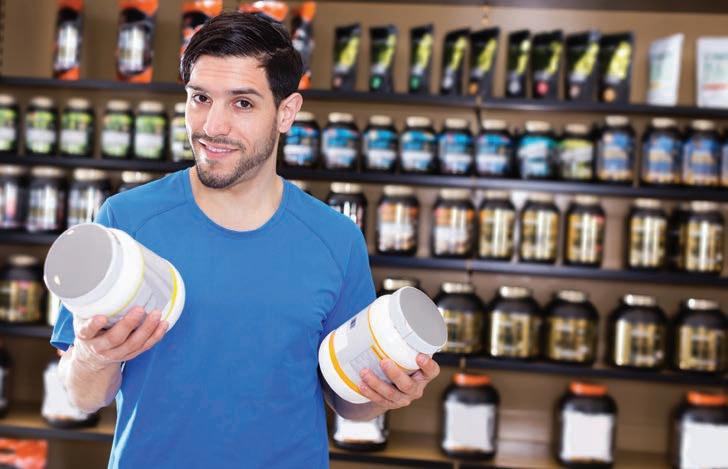
that it may help to protect against oxidative stress and balance cellular energy in other parts of the body, including the heart and brain. Research published last year in the journal Nutrients underscores the benefits of creatine monohydrate in mitigating neurodegenerative diseases such as Parkinson’s and Huntington’s, as well as sarcopenia, a muscle-wasting condition prevalent in older individuals. Creatine also shows promise in addressing chronic fatigue syndrome, mild traumatic brain injury, cardiovascular disease and long COVID.
A systematic study published last year in Frontiers in Nutrition shows that creatine monohydrate supplementation can enhance memory, information processing speed and attention span in adults. Cases of osteoporosis and frailty have also shown improvement, especially when creatine intake is combined with resistance training.
For optimal fitness outcomes, creatine powder is preferred due to its notable stability compared with other forms such as liquid and ethyl ester, which tend to be less effective and prone to breakdown before adequate utilization. Regarding dosage, Nakasone recommends starting with three grams a day, and, if it is tolerated well,

gradually increasing it to five grams for a greater effect, if desired. However, he cautions against exceeding this dosage limit.
The Mayo Clinic endorses the safety of creatine when used as prescribed and suggests its use for up to five years by healthy individuals, noting that it does not appear to cause kidney damage in individuals with healthy kidney function. Potential interactions include a reduction in creatine’s efficacy when combined with caffeine. Creatine supplementation with 300 milligrams of caffeine or greater may hasten the progression of Parkinson’s disease. The Cleveland Clinic advises anyone with chronic kidney disease and other kidney-related problems to avoid taking creatine.
Research published in the Journal of the International Society of Sports Nutrition in 2021 dispels common misconceptions regarding the side effects of creatine, including testosterone increase and hair loss. Nevertheless, some people report mild water retention for the first week when the supplement is first introduced into their regimen.
Zak Logan is a freelance health writer dedicated to holistic living and getting back to basics.

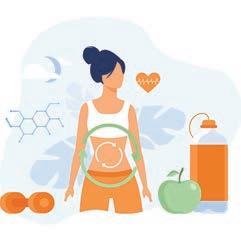
by Carrie Jackson
Located on top of the kidneys, the adrenal glands are responsible for regulating the body’s response to stress. When working properly, they release hormones such as cortisol and epinephrine, enabling us to respond appropriately to physical and emotional triggers. However, prolonged stress can trigger an overactive response and symptoms known as adrenal fatigue. By regulating the nervous system and adopting mindful lifestyle choices, people can effectively manage their symptoms and learn to respond to stress in a healthier way.
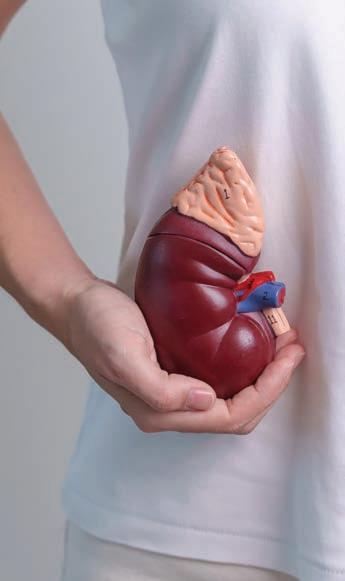
Stress can come from many sources. “While we often think of stress in psychological terms, it may also come from factors like sleep deprivation, overtraining, skipping meals or being overworked. For many men, the pressure to do everything leads to complete burnout,” says Alexandra MacKillop, DC, a Chicago-based functional medicine doctor.
The body normally releases stress hormones for a brief period before returning to baseline levels. However, with adrenal fatigue, we lose the ability to manage stress this way. MacKillop explains, “In stage one, the hormones are produced in excess. In stage two, the body loses the ability to differentiate periods of stress and rest, and cortisol and DHEA [dehydroepiandrosterone] levels run inappropriately high or low. In stage three, the body altogether fails to produce a sufficient adrenal response, resulting in the symptoms we refer to as adrenal fatigue.”
Symptoms vary in severity and condition. “In addition to causing fatigue, brain fog, sleep disruptions, lightheadedness, irritability and other neurocognitive symptoms, adrenal fatigue manifests with decreased libido, difficulty building muscle or burning body fat, hair loss, body aches, low blood pressure, salt and sugar cravings, and patches of hyperpigmented skin,” MacKillop points out.
According to MacKillop, the initial step in addressing a condition is to accurately diagnose and identify its underlying cause, rather than solely focusing on symptoms. “Treatment is patient-specific according to the root cause and may involve nutritional strategies for managing blood sugar such as supplementing with electrolytes and other salts to regulate blood pressure. Other nutraceutical strategies include adaptogenic herbs, protomorphogen extracts and addressing hormonal imbalances in the body,” she says.
Dr. Tricia Pingel, a licensed naturopathic physician based in Arizona, asserts that shifting the nervous system from the sympathetic (fight-or-flight) mode to the parasympathetic (rest-and-digest) mode can alleviate adrenal fatigue. “Our adrenal glands are responsible for deciding what’s a stress trigger, but they don’t know if it’s a small or big stressor. While you’re probably not being chased by a bear, it could be that email from your boss that ticks you off or an emotional reaction to something you saw on social media. When we react with fear of any sort, our adrenal glands trigger to protect us,” she explains.
By acknowledging the source of stress and actively deciding how to respond, individuals can effectively regulate their nervous system’s response. Pingel recommends pausing to contemplate appropriate actions in stressful situations, consciously

deciding to either directly address the issue if it is within their control, delegate the responsibility to someone else or allow the stress to dissipate when it is not worth the struggle.
“When you are under stress, the body depletes nutrients quickly. This is especially true of vitamins C, B5, B6 and B12, folate and minerals such as magnesium, selenium and zinc. Eating whole, nutrientdense foods provides the fuel to offset the stressors,” says Pingel. “I recommend a Mediterranean-based, anti-inflammatory diet that includes a variety of colors. Greens can come from kale, romaine, arugula and chard. Berries provide fiber and antioxidants, while nuts and seeds add healthy fats. Non-GMO tofu, wild-caught fish, organic and grass-fed poultry and eggs add clean protein. Make sure that
you’re being mindful when you eat. Sit down, have a conversation and chew. This calms the mind and allows you to digest.”
For additional support, Pingel suggests herbal supplements such as ashwagandha and Rhodiola rosea to calm the body, phosphatidylserine and L-theanine to suppress cortisol output and herbs like valerian to help calm the brain. Ideally, supplements should be taken before bedtime, when the body is calmer and has time to absorb them.
Balancing movement and rest can also help manage symptoms. Pingel explains, “Focusing on building muscle, especially in your core, can boost the metabolism and help your body regulate. Yoga, tai chi and strength training, combined with a light cardio activity, can give you time to repair from the triggered state.”
Our mindset has a huge impact on our nervous system. “No amount of supplements will do anything if the body is not calm,” Pingel points out. “Health trackers and apps can help people train their brain from beta to alpha waves. Breathing is our natural way to get into the parasympathetic
state. It pulls on the diaphragm, which in turn stimulates the vagus nerve. Humming, singing and other vocalization can have a similar impact and help relieve stress.”
Ultimately, cultivating an attitude of gratitude proves remarkably effective in mitigating adrenal fatigue. “If you come from a place of love and gratitude instead of fear and anger, you can actually change the way your body interprets it,” notes Pingel. “Reframe the messages your body is sending you as a reminder to practice self-care, and treat yourself with love, compassion and gratitude.”
Carrie Jackson is a Chicago-based freelance writer and frequent contributor to Natural Awakenings. Connect at CarrieJacksonWrites.com.




by Ruth Roberts, DVM, CVA, CVH, CVFT, NAN
Birds are captivating, intelligent and long-lived companions, but their care demands commitment and expertise.
According to a paper presented by certified veterinary technician Liz H. Wilson at an American Veterinary Medical Association forum, when selecting a bird species, consider the following factors.
• Space: Large birds such as macaws require spacious cages, while smaller birds like budgies can thrive in more compact enclosures.
• Noise: Consider noise tolerance before choosing a bird as a pet, especially in shared households with multiple occupants. Cockatoos and conures can be very loud, while canaries and finches are generally quieter.
• Lifespan: Some bird species have a relatively short lifespan, while African greys and cockatoos can live more than 50 years. As a result, owners must plan for long-term care when choosing certain birds as pets.

• S o cial Needs: Parrots and other social birds need regular interaction to maintain their mental well-being. Lack of social contact can lead to stress, aggression and feather plucking.
• Allergies: Powder-down species, such as cockatiels and cockatoos, produce dander that can exacerbate respiratory conditions like asthma.
Choosing the appropriate home environment is crucial when keeping a bird as a pet. The Association of Avian Veterinarians Basic Care for Companion Birds guide notes that birds are usually comfortable in the same room temperatures that people enjoy. However, sudden temperature fluctuations can make a sick bird’s condition worse. Pet birds can thrive in both dry and humid air, although tropical birds may benefit from extra moisture. Fresh air and natural sunlight also support good health, provided a shady spot is available to prevent overheating.
Many pet birds have limited exposure to fresh foods. Nicole Sztabkowski, a holistic pet health coach in British Columbia, Canada, shares that she acquired her two green-cheeked conures, Cheche and Atlas, when they were 2 and 3 years old. Their diet had consisted mainly of seeds, and like so many parrots, they had never been introduced to the wide variety of fresh foods they require for optimal health.
Over time, Sztabkowski transitioned them to a nutrient-rich diet. “Birds thrive on diversity, and a well-rounded diet includes a
mix of fruits, vegetables, sprouted grains and even fresh teas like chamomile,” she explains. A nutritious diet should include:
• Fruits in moderation due to natural sugars, including berries, apples (without seeds), bananas, mango, pomegranate, kiwi and dragon fruit
• Vegetables should make up a large portion of the bird’s diet, featuring bell peppers, carrots, leafy greens, broccoli, squash and zucchini
• Grains and seeds such as quinoa, brown rice, oats, flaxseeds and millet
• Legumes cooked and rinsed, including lentils, chickpeas, black beans and kidney beans
• Herbs and teas such as chamomile, dandelion, hibiscus, basil and cilantro
While some commercial pellets can be included, they should not replace fresh food. “Much like the dog food industry has pushed kibble, the bird world has shifted toward ultra-processed pellets as the ‘ideal’ diet. We’ve lost sight of what these still-wild, exotic animals actually need,” admonishes Sztabkowski.
Certain foods are toxic to birds. “Chocolate, onions, avocados, garlic, caffeine, alcohol, high-salt and high-sugar foods, fruit pits and apple seeds (which contain cyanide) are all dangerous,” warns Sztabkowski.
Birds need clean, fresh water. Pet owners should change the pet’s water at least twice
a day and wash their water bowls daily to prevent bacteria caused by the bird dipping food into the bowl. “Bird-safe water fountains can also encourage them to drink,” says Sztabkowski.
A common avian health issue is fatty liver disease, which results from eating too many high-fat seeds. “The first signs are feather color changes, fatigue and weight gain,” says Sztabkowski. A balanced diet of fresh veggies, whole grains and lean proteins from legumes can help prevent this.
Breathing problems are another issue. “Airborne toxins can make it hard for birds to breathe,” Sztabkowski explains. Good airflow and avoiding strong artificial smells can lower the risk. Common culprits include air fresheners, plug-ins, bleach, scented candles, paint fumes, plastic roasting bags and personal products like perfume or nail polish if used regularly nearby.
Most birds don’t have a strong odor. “Dustier species like cockatiels might have a faint scent, but it’s rarely offensive,” says Sztabkowski. Odors typically come from cage liners or stale food, not the birds themselves.
Some birds develop avian gastric yeast, a fungal stomach infection. “It’s tricky because symptoms come and go,” says Sztabkowski. Eating bird-safe probiotics and living in a calm, low-stress home can help their digestion. While bird-specific probiotic supplements like Avi-Culture and Bene-Bac are effective during stress and after antibiotics, Sztabkowski prefers natural choices such as unsweetened applesauce, sprouted grains, dandelion greens and herbal teas like chamomile and hibiscus to promote healthy digestion and microbial balance.
Birds need mental and physical engagement to prevent boredom, stress and behavioral issues like feather plucking or excessive screaming. Ways to keep birds stimulated are:
• Toys: Rotate foraging, shreddable and puzzle toys.
• Exercise: Provide supervised flight time or climbing structures.
• Socialization: Interact, train and talk to them daily.
• Food variety: Use foraging toys or skewers to make meals engaging.
• Sensory enrichment: Play calming music or provide safe window views.
Ruth Roberts is an integrative veterinarian and holistic health coach for pets, as well as the creator of The Original CrockPet Diet. Learn more at DrRuthRoberts.com.

by Megy Karydes
Movement serves as a universal language, and one of the most powerful ways fathers can connect with their children. According to a study published in the American Journal of Lifestyle Medicine, when parents model active lifestyles, they not only boost their own fitness but also lay the foundation for their children’s lifelong physical, social and cognitive development.
Regular physical engagement builds habits that can lead to healthier, happier lives. When a family engages in such activities together, what may have started out as exercise becomes a memory-making, relationshipenhancing and mood-boosting occasion.
Whether tossing a ball, hiking a trail or simply dancing in the living room, physical activity provides dads and kids a shared experience that strengthens their bond. There are many easy ways to spend quality time together, away from the distractions of screens and daily routines.
“The goal, at least from my parenting perspective, is to raise healthy, happy and resilient kids. A lot of people take for granted how powerful play can be,” says Brian Comly, an occupational therapist and father of two who founded MindBodyDad. com to help families enjoy movement, play and togetherness. “It’s important for adults
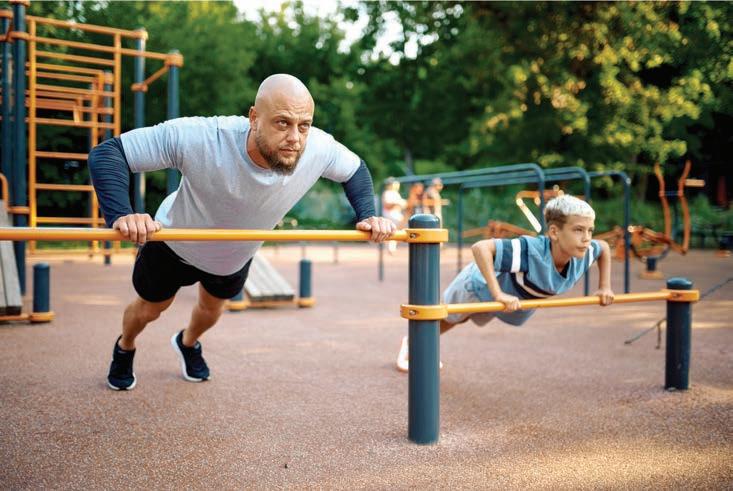
to model curiosity, creativity and connection, and instill these skills early. Oftentimes, the substitute is a phone, tablet or TV, which actually inhibits or atrophies these skills.”
W. Zach Smith, a Seattle-based physical therapist and founder of HIDEF Physical Therapy, believes that modeling healthy behavior and starting early is paramount, and it doesn’t have to be overly complicated. “Starting from a young age, I would bring my kids to the garage when I worked out. Now, both of them will copy me and grab small, one-to-three-pound dumbbells and do a lot of the exercises that I do,” Smith shares, adding that when the kids were younger, they would help him with the yard work, pulling the garden cart and picking up after him.
Rucking, a practice where a child is strapped to the back of a parent or caregiver for a walk, has been a favorite activity for both Comly and Smith. Smith notes that rucking not only enhances the physical challenge for the parent but also provides immense enjoyment for their children. As his daughter has matured, she has developed the ability to jump out of her stroller and run alongside it for extended periods, alternating between running and resting.
Physical activities foster a deeper connection between individuals, extending beyond simple muscle development. Andres Ochoa, a project manager in Chicago and a father of two daughters aged 10 and 12, has observed that engaging in shared physical activities strengthens their family bond. After meeting their respective sports commitments during the week, Ochoa makes sure to dedicate the weekends to family time.
Ochoa finds that shared physical activities enable him to remain fully present and focused, while minimizing distractions. “Being together and active creates moments of true connection, where kids feel seen and valued,” he says, noting that such moments can lead to meaningful conversations, stronger emotional ties and improved communication.
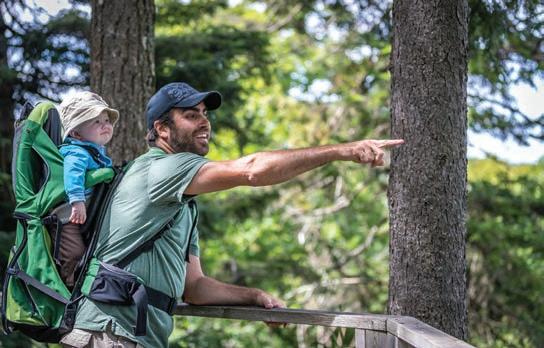
Depending on the season, Ochoa may take his daughters to their local YMCA to practice basketball or ride bikes on a nearby trail. Occasionally, they will set a family goal such as completing a 5K run. Ochoa’s primary objective is not to introduce additional stress into their lives. They participate in the Turkey Trot every year, and in the absence of scheduled races, engage in runs as a family, challenging each other. He often allows his daughters to take the lead in selecting their activities.
Even with today’s digital distractions, dads that prioritize physical activity find creative ways to incorporate movement into their daily routines. For instance, Ochoa walks his daughters to school every Friday whenever possible. If the weather is bad or they are headed somewhere after school, he strategically parks several blocks away, allowing them to walk for a portion of the journey.
While structured sports offer numerous benefits, Comly reminds parents not to forget about unstructured play. “Kids, for hundreds of thousands of years, evolved to explore the environment, not plastic toys,” he quips. “That’s literally how they learn and how they grow. They are meant to engage with each other, and in a natural environment, and the parent’s role is to help facilitate that, not interfere with it.”
Megy Karydes is a Chicago-based writer and author of 50 Ways to More Calm, Less Stress.

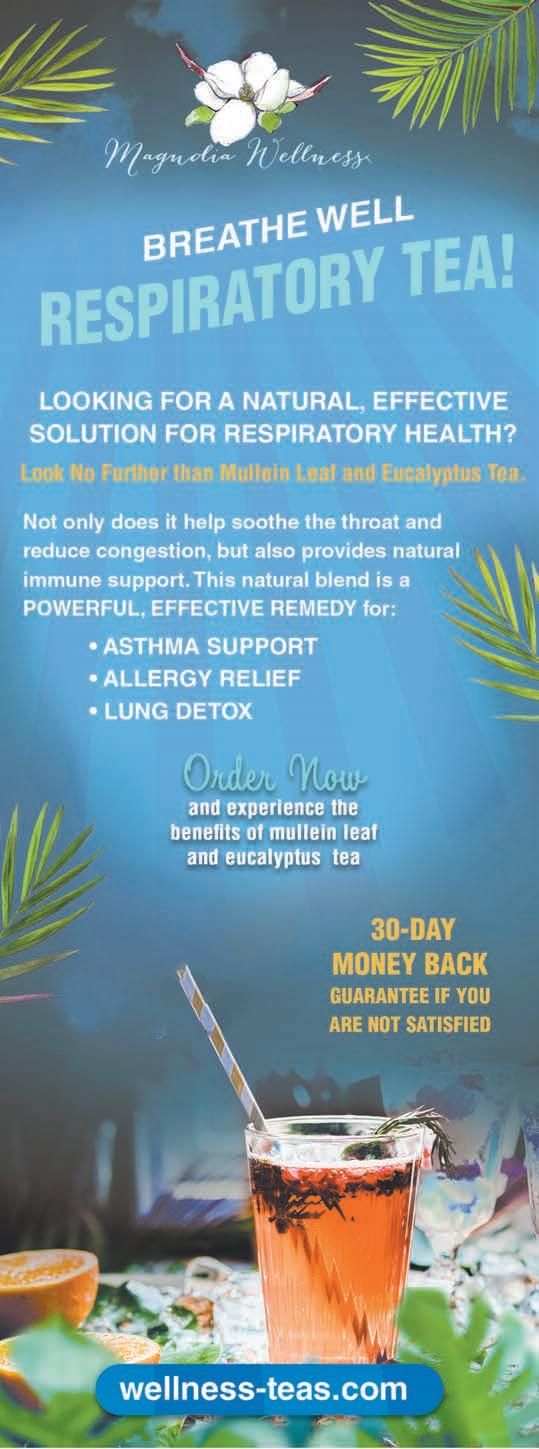
by Chloe Karydes Krecun
Portable and packed with beneficial nutrients, protein bars are a popular snack for busy lifestyles, fitness enthusiasts and anyone looking to curb cravings and meet nutrition goals. While store-bought options are widely available, do-it-yourself (DIY) protein bars are easy to customize for individual dietary needs.
“A lot of people snack based on convenience,” says Melody Schoenfeld, a certified personal trainer in Pasadena, California. Protein bars offer a tasty, filling and nutritional goodie that can be consumed in just a few bites.
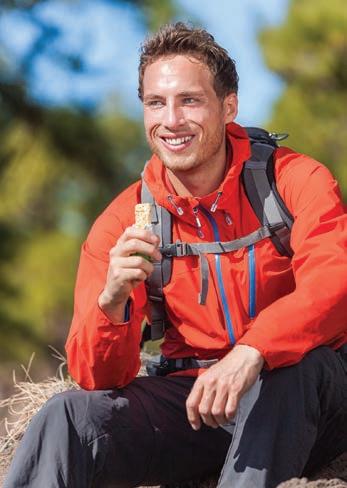
Yasi Ansari, a dietitian nutritionist, specialist in sports dietetics and spokesperson for the Academy of Nutrition and Dietetics, explains that homemade protein bars offer a fully customizable approach to nutrition. “Since the bars are DIY, you have full control over ingredients and flavor profiles,” she says. This means avoiding artificial additives, excessive sugars or allergens that may be present in commercial options.
Protein is a complex molecule made of amino acids that provides energy and functions as the building block for bones, muscles, cartilage, skin and blood. “It is the one macronutrient that is never abjured by fad diets,” says Janet Chrzan, Ph.D., a professor of nutrition at the University of Pennsylvania. “We have a cultural preference for protein; we Americans often consider it to be the most important element of food.”
As a health and nutrition coach, Schoenfeld advocates for convenient and easy ways to get protein into a diet. For many, protein bars fill that void. “For most people age 18 and beyond, we’re looking at consuming somewhere between 0.8 to 1.2 grams of protein per pound of body weight for a healthy adult daily,” Schoenfeld recommends.
Before diving into a recipe, Ansari says it is important to determine how the bar will address a dietary need and ask, “Am I looking for a bar that helps with postworkout recovery, a snack to keep me full between meals or a fiber-rich option to support digestion?”
Knowing the purpose can guide ingredient selection. “For example, if it’s for the purpose of recovery, we’re going to want to make sure we’re getting close to 20 grams of protein per bar for muscle repair and building, while also getting enough carbohydrates to restore energy,” says Ansari. Ingredients like dried fruits, oats or whole grains help boost carbohydrate content, making the bars more effective for postworkout replenishment.
For those aiming to create a gut-friendly bar, Ansari suggests being mindful of sugar alcohols and artificial sweeteners that can cause digestive discomfort. “Consider smooth nut or seed butters if sensitive to crunchy varieties, and aim for fiber from nuts, dried fruits, flax and chia seeds,” she adds.
Both Schoenfeld and Ansari note that the greatest advantage of making protein bars at home is being able to select high-quality, nutrient-dense ingredients. Whether addressing dietary restrictions, avoiding allergens or satisfying a preference for organic, whole foods, DIY protein bars allow for total ingredient transparency.
A little investment of time helps ensure that healthy, smart and convenient snacks will always be within reach. Ansari offers these suggestions when crafting a protein bar at home:

• C hoose a protein: Plant protein powders such as pea protein blend easily and well. Alternatives to powders include almond or seed butters, or whole nuts and seeds that can be chopped in a food processor.
• C hoose a fruit: Fruits add fiber, micronutrients and antioxidants. Aim for two to three grams of fiber per bar. Tasty sources include dried apricots, dried cherries, dried apples, raisins and dates.
• Add spices: To amplify the flavor profile, include spices such as cinnamon, pumpkin spice or nutmeg.
• E xperiment with texture: Add rice cereal for crunch or oats for a chewy consistency.
• Include healthy fats: Options include walnuts, flaxseeds, chia seeds and coconut oil.
• Incorporate carbohydrates: Oats, rice cereal or dried fruits are great choices for energy.
• C hoose natural sweeteners: Dried fruits provide sweetness to any bar, as well as fiber and nutrients like iron and vitamins A and C. A bit of fruit juice can also help blend the ingredients together. Other healthy alternatives are honey and maple syrup.
Chloe Karydes Krecun is a student at the University of Illinois Urbana-Champaign. Connect with her at LinkedIn.com/in/chloe-karydes-krecun.
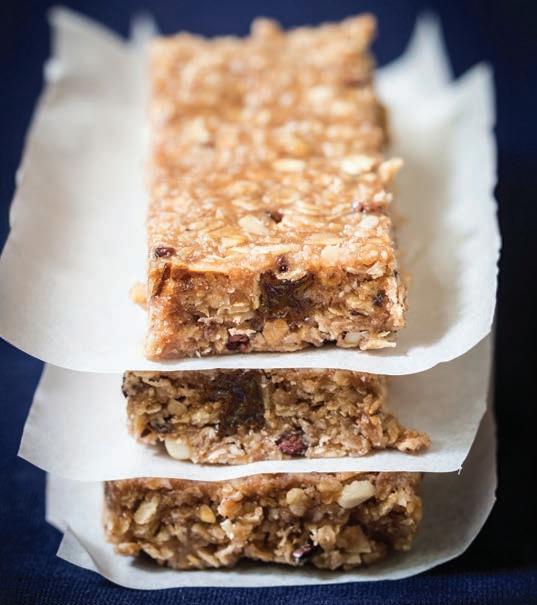
These yummy bars provide iron, vitamin C, omega-3 and potassium.
YIELD: 12 BARS
5 Medjool dates, pitted
⅓ cup dried apples
1½ cup old-fashioned oats
1 tsp chia seeds
1 cup almond or seed butter
⅓ cup protein powder (derived from brown rice or peas)
2 tsp cinnamon powder
1 tsp vanilla extract
Optional: 1 Tbsp water or apple juice to blend if too sticky or crumbly
Mix dates and dried apples in the food processor. Add oats, chia seeds, almond or seed butter, protein powder, cinnamon and vanilla extract. If the almond or seed butter is too stiff before adding it to the food processor, gently warm it in the microwave for 15 to 30 seconds or place the jar in a bowl of hot water to loosen it. Slowly blend the mixture until thickened. If the blend is too sticky or crumbly, add 1 tablespoon of water or apple juice for a softer texture.
Line a 13-by-10-inch baking pan with parchment paper. Add the mixture and firmly press down to spread it out evenly. Place the pan in the refrigerator for two hours before cutting into bars.
Recipe courtesy of Yasi Ansari, MS, RDN, CSSD, spokesperson for the Academy of Nutrition and Dietetics.
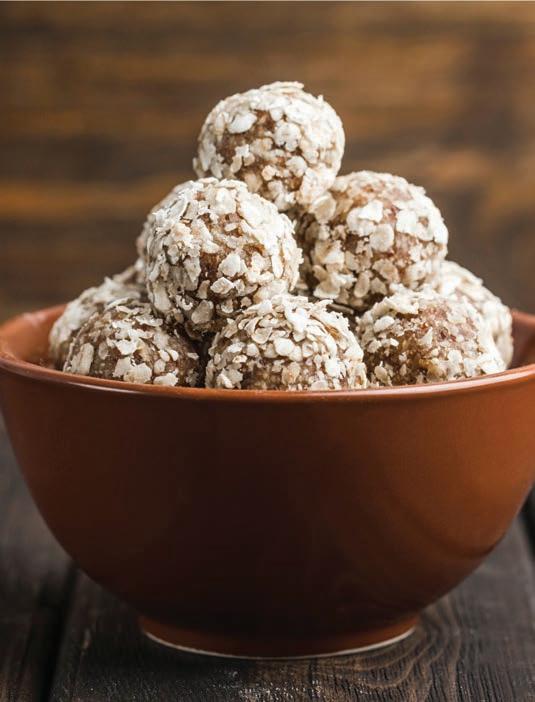
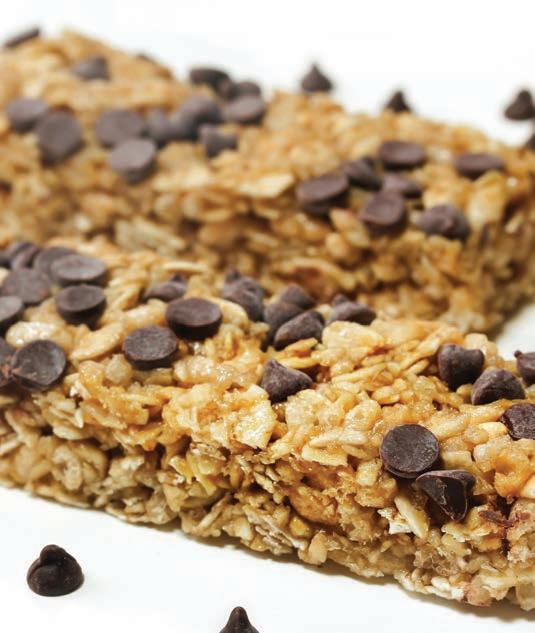
For a boost of vitamins A and C, fiber and healthy fats, try these easy-to-make treats. Drinking extra fluids is recommended when consuming no-bake oat bites.
25 BITES
¾ cup smooth almond butter or sunflower seed butter
½ cup pumpkin puree
½ cup ground flax seeds
¼ cup honey
2 tsp pumpkin pie spice
1½ cup old-fashioned oats
Combine all the ingredients except for the oats in a large bowl. Form one to two tablespoons of the mix by hand into round bites. Roll the bites in the oats and place them in a bowl. Place the bowl of bites in the freezer for 45 minutes to two hours based on desired firmness. Store in the refrigerator in an airtight container for up to six days, or keep them in the freezer for up to three months.
Recipe courtesy of Yasi Ansari, MS, RDN, CSSD, spokesperson for the Academy of Nutrition and Dietetics.
YIELD: 10 BARS
1 cup peanut butter or other nut or seed butter
½ cup honey
1 cup rolled oats
¼ cup chia seeds
2 Tbsp protein or collagen powder (or additional peanut butter)
½ cup mini chocolate chips
Combine all ingredients into a mixing bowl and mix well.
Form mixture into 1-inch by 3-inch bars. Add slightly more honey or peanut butter to make the batter wetter, or slightly more oats and powder to make the mixture dryer to form into bars.
Place bars in a glass container and chill in the refrigerator for 30 minutes before serving. The bars will keep in the refrigerator for about one week or in the freezer for about one month.
Recipe courtesy of Holley Samuel, MEd, RD, CSSD, CPT, a sports dietitian.
Natural Awakenings Magazine!
Make a meaningful impact in your community by becoming the owner of a Natural Awakenings magazine.
Empower others with current, valuable insights and resources to enhance their physical, mental, emotional and spiritual well-being.
As a franchise owner, you’ll inspire positive change, provide readers with tools for healthier living and connect local businesses with an audience eager for transformation.
Why Own a Natural Awakenings Magazine?

n Create a Healthier Community: Be the go-to resource for wellness and personal growth in your area.
n Boost Your Income: Take control of your financial future with a proven business model.
n Enjoy a Flexible Lifestyle: Work from home while pursuing a fulfilling, dynamic career.
n A proven business model with low startup costs.
n Comprehensive training and friendly, ongoing support.
n Flexible work schedule with many work-from-home opportunities.
n Access to a network of like-minded franchise owners.
n Financing Options Available.
Join a thriving network of passionate franchise owners reshaping the future of holistic health and wellness.
Call 239-206-2000 for a FREE evaluation of your community’s potential. Learn more or apply today at: Corp.NaturalAwakenings.com
Add Your Community to Where Natural Awakenings Is Now Publishing:
• Atlanta, GA
• Boston, MA
• Broward County, FL
• Bucks/Montgomery Counties, PA
• Central Florida/Greater Orlando, FL
• Central New Jersey
• Charlotte, NC
• Chicago, IL
• Columbia, SC
• Dallas, TX
• Daytona/Volusia/Flagler Counties, FL
• Detroit/Wayne County, MI
• Fairfield & Southern Litchfield Counties, CT
• Gainesville/Ocala/The Villages, FL
• Grand Traverse Region/Northern Michigan
• Greater Ann Arbor, MI
• Greater Lansing, MI
• Greater Oakland, Macomb, Livingston, Genesee, MI
• Gulf Coast, Alabama/Mississippi
• Hartford/Tolland, CT - Coming soon
• Houston, TX
• Hudson County, NJ
• Jacksonville/St. Augustine, FL
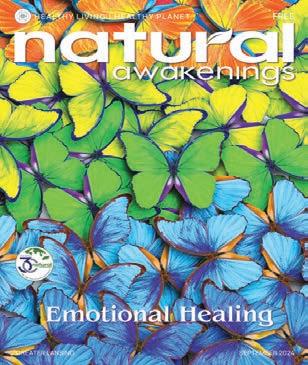
• Lancaster/Berks, PA
• Lehigh Valley, PA
• Long Island, NY
• Milwaukee, WI
• Monmouth/Ocean Counties, NJ
• Naples/Fort Myers, FL
• New Haven, CT
• New London/Windham, CT - Coming soon
• New York City, NY
• North Central New Jersey
• North New Jersey
• Northwest Florida
• Palm Beach, FL
• Philadelphia, PA
• Phoenix, AZ
• Pittsburgh, PA
• Rhode Island
• Richmond, VA
• Sarasota, Manatee, Charlotte and DeSoto Counties, FL
• South Central Pennsylvania
• South Jersey, NJ
• Southeast North Carolina
• Space & Treasure Coast, FL
• Tampa, FL
• Tucson, AZ
• Twin Cities, MN
• Westchester/Putnam/Dutchess, NY
• Western Michigan

by Sandra Yeyati
Carl Greer is a retired clinical psychologist, Jungian analyst and shamanic practitioner. For decades, he has combined all three disciplines to help people resolve mental, behavioral and emotional disorders; integrate their conscious and unconscious minds; and receive spiritual healing. He has taught at the C.G. Jung Institute of Chicago and the Replogle Center for Counseling and Well-Being.
Through his philanthropic foundation, Greer has contributed to more than 60 charities and awarded more than 2,000 scholarships to aspiring students of science, technology, engineering and mathematics. He holds a doctorate in finance and management from Columbia University and a doctorate in clinical psychology from National Louis University’s Illinois School of Professional Psychology.
Building upon his previous titles, including Change Your Story, Change Your Life and The Necktie and The Jaguar, Greer’s latest book is Go Within to Change Your Life: A Hidden Wisdom Workbook for Personal Transformation.
Most people ask themselves, “Why did I just say that?” or “Why did I do that?” Similarly, people are often unable to stick to their New
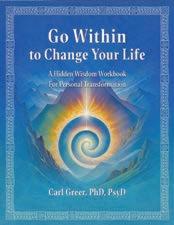
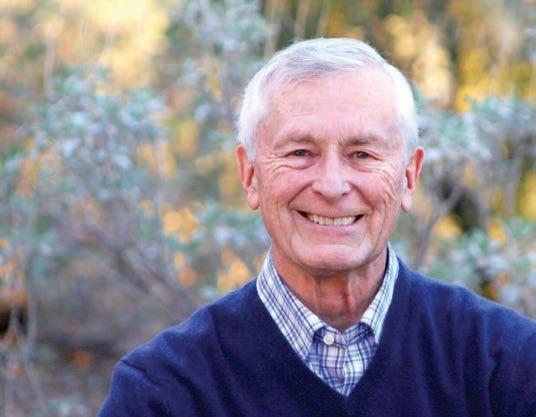
Year’s resolutions, which they presumably really wanted to achieve when they set those goals. My belief is that there are hidden parts of ourselves that are influencing our behavior, and if we want to make changes in our lives, we need to go within to discover those parts of ourselves and get insights that heretofore have been hidden from us.
Why do you say that we are stuck in a story written by someone else?
We have influences from our past—including our genetics, upbringing and life experiences—that have both consciously and unconsciously influenced where we are right now and will influence our future. If we want to break free from those influences, we have to do some things differently.
We have to recognize what’s holding us back, and it’s often a story about how to achieve happiness and success that isn’t working for us and that we adopted without realizing it. These stories are often written by our families, communities and cultures.
How do you define “hidden wisdom”?


It’s a Jungian idea. Part of our psyche is what we’re aware of—our ego consciousness. Another part of the psyche that’s influencing us is our unconscious—both the personal unconscious (things we’ve chosen to keep hidden from our consciousness) and the collective unconscious (what Carl Jung described as containing archetypal energies that influence how we think, act and feel). By uncovering our hidden wisdom, we can make different conscious decisions.
The book has journaling prompts that encourage readers to answer some introspective questions about themselves, but it also has exercises like guided visualizations and shamanic journeys for tapping into their unconscious. This way, readers can gain a deeper understanding of themselves—what’s working or not working for them, and what they most want.


Join as a KnoWEwell Regenerative Whole Health member
TO
YOUR HEALTH AND WELL-BEING
VETTED PRACTITIONERS
Find your best-matched vetted holistic and whole health providers
WEBCASTS
700+ and Growing ive and On-Demand Expert Webcasts
EDUCATIONAL SHOWS
Curate your own library of 160+ and Growing Whole Health Expert hows
COMMUNITIES
Make meaningful connections in 200+ and growing Whole Health & Expert Communities
DISCOUNTS
Get discounts on expert healing programs and courses
Natural Awakenings
readers receive a 30% discount on KnoWEwell memberships.
Join at: nowewell.com/ communi /join-individuals



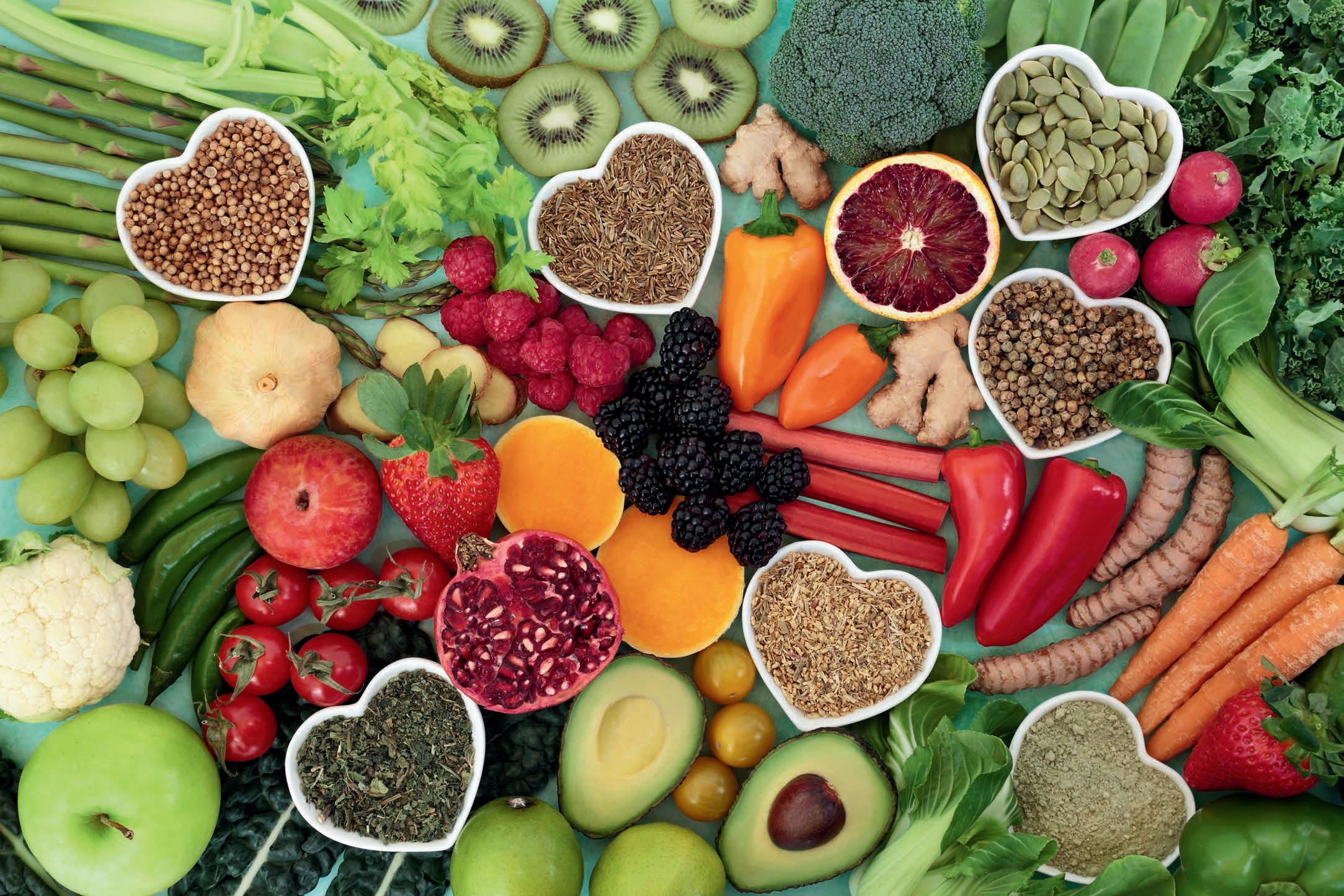

FRIDAY, JUNE 6
Intuitive Circle – Grow Your Happiness: Living the Power of Now – 6:30-8pm. Join with like-minded spiritual seekers to awaken your intuitive gifts! We’ll practice tools and techniques to raise your energetic vibration, tap in to your intuition, and develop your psychic gifts. Everyone is intuitive and by learning the tools you will be able to trust your inner guidance and find more joy and growth on your life path. Register at CommunicateWithAngels.com/ events. Studio D Yoga, 9327 Midlothian Tpke., Ste. 1B, North Chesterfie. $25.
SATURDAY, JUNE 7
Half-Day Silent Meditation Retreat –10am-2pm. Designed for those with an intermediate practice, this four-hour retreat prepares you for longer silent retreats. Benefits of a half day silent retreat: deepens your meditation practice; increases confidence and curiosity; enhances your connection to yourself; cultivates selfcompassion and compassion for others; provides a structured opportunity to practice mindfulness without disrupting your daily life. Register at InnerworkCenter. org. Innerwork Center, 213 Roseneath Rd. Richmond, VA. 804-359-03. $43+.
SATURDAY, JUNE 7
Veg In The 'Burg Vegfest 2025 – 11am-5pm. Get ready, Petersburg—Veg In The 'Burg is back and better than ever! Join us for a free, family-friendly plant-based cookout packed with food, fun, games, and good vibes. Whether you’re vegan, veg-curious, or just down for a delicious bite, you’re welcome here. No pressure, just positive vibes and powerful info on how fruits and veggies can fuel your body and your healing journey. Bring your blankets, lawn chairs, friends, and competitive spirit—there’ll be games, local vendors, and plenty of plant-based goodness to go around! Petersburg Public Library, 201 W Washington St. Petersburg, VA. To learn more, visit YourPartnersInWellness.org. Free.
FRIDAY, JUNE 20
Summer Solstice Guided Labyrinth Walk – 6-7pm. Explore how the ancient healing practices of Ayurveda can heal our modern-day minds and bodies. Delve into the basic tenets of the science through the six pillars of health. Take away helpful daily routines that will help restore mind, body, and spirit to whole health. You’ll explore the science related to the dangers of stress on the human body, mind, and spirit and learn Ayurvedic practices and routines that will not only reduce stress but will begin to help restore balance and personal wellbeing. Register at Innerworkcenter.org. The Labyrinth - Located in Yaupon Place, across the street from 3318 Loxley Rd. Richmond, VA 23227. 804-359-0384. Free.
GO TO NARichmond.com/Calendar for current offerings, updates and additional listings. Please double-check with the host prior to an event to ensure the information is accurate.
Carytown Farmers Market – 9am-1pm. Richmond's premier Sunday market, created to provide local farmers, makers, and consumers the opportunity to deal directly with each other. City Stadium, 3201 Maplewood Ave., Richmond, VA. CarytownMarket.com. Free.
Goat Yoga Brunch & Bubbly – 11:30am1:30pm. Pactamere Farm and Goat Yoga RVA are hosting morning goat yoga followed by a delicious brunch with unlimited mimosas. During the 45-minute class, your certified instructor will guide you into a series of poses with the assistance of our 26 Nigerian dwarf goat yogis. Pactamere Farm, 15577 Stone Horse Creek Rd., Glen Allen, VA. Tickets available at PactamereFarm.com. $65.
The Bench – Community Sit (every 4th Sunday) – 4-5pm. Step away from the noise and into stillness. The Bench is a simple gathering for shared silence, open to everyone regardless of experience or background. There is no agenda, no particular style, no instruction, and no expectations. It’s an invitation to simply come as you are, sit in silence, and be. 804-359-0384 Register at InnerworkCenter.org. Innerwork Center, 213 Roseneath Rd., Richmond, VA. Free.
Sunday Sound Meditation – 6:30-7:30pm. Experience the profound effects of sound vibrations as you journey inward on a wave of relaxation and healing. $5-$25 sliding scale. LivingWaterrva.com. 1000 Westover Hills Blvd, Richmond, VA.
Level 2 Flow Yoga – 9-10:15am. Start your week right with a yoga class that is beyond a beginner’s level. Participants will incorporate new poses and increasingly challenging options. $70/4 classes/mo, $20/ drop-in.Glenmore Yoga & Wellness Center, 10442 Ridgefield Pkwy, 804-741-5267. GlenmoreYoga.com.
Ageless Yoga – 10:30-11:45am. A balanced practice that incorporates basic yoga postures, breath awareness and relaxation. Poses are modified to meet individual needs. Students transfer to and from the floor and the class generally includes a Vinyasa flow of standing poses, guided by breath for a portion of class time to increase stamina and strength. Students continue to develop body awareness to keep the joins safe, increasing range of motion and improving balance. Glenmore Yoga & Wellness Center, 10442 Ridgefield Pkwy. 804-741-5267. GlenmoreYoga.com.
Navigating Loss With Compassion (Online) 6:30-8pm. During this six-week journey, you will learn how to talk about feelings associated with grief and be offered the opportunity to be cared for and supported to attend to grief. Through vulnerability and release, the heart
can be healed, and we can move towards the state of wholeness. Interested participants are required to fill out a pre-screening form, to be reviewed by the facilitator. Register at InnerworkCenter.org Innerwork Center, 213 Roseneath Rd. Richmond, VA. $155+.
Beginner Qigong with Jonah Marsh –5:30-6:45pm. Qigong is an ancient practice which combines graceful movements with abdominal breathing and mindfulness, allowing us to connect with nature and balance the body’s circadian rhythms. Jonah has been studying Chinese internal martial arts and qigong since 2011. $5-$25 sliding scale. LivingWaterrva.com. 1000 Westover Hills Blvd., Richmond, VA.
The Artist's Way – 6:30-8:30pm. This 12-week course is for all who seek to get in touch with their imagination, inner self and playful nature. 804-359-0384 Register at InnerworkCenter. org. Innerwork Center, 213 Roseneath Rd., Richmond, VA. $155+ Scholarships available.
Beginner-Level Yoga – 9-10:15am. Balanced practice that incorporates basic yoga postures, breath awareness & relaxation. Postures modified to meet individual needs. Online & in-person. $70/4 classes/mo, $20/ drop-in. Glenmore Yoga & Wellness Center, 10442 Ridgefield Pkwy. 804-741-5267. GlenmoreYoga.com.
Yoga for Bone Health – 9:45-11am. Increase bone & muscle through the use of yoga with a combination of dynamic & static yoga poses. Chris Riely. $70/4 classes/mo, $20/drop-in. Glenmore Yoga & Wellness Center, 10442 Ridgefield Pkwy. Registration required: 804741-5267 or GlenmoreYoga.com.
Fundamentals Pilates Mat Class (Online) – 10:45am-12pm. This Pilates Mat Class with Dianne Powers will include the basic exercises emphasizing alignment, elongation of the spine and healthy posture. It will focus on the execution of efficient movement achieving improved core strength and endurance. $70/4 classes/mo, $20/drop-in. Glenmore Yoga & Wellness Center, 10442 Ridgefield Pkwy. 804741-5267. GlenmoreYoga.com.
Slow and Gentle Yoga – 11:30am-12:45pm. An in-studio or online class with a yoga therapist. $70 for 4 classes in a month; $20 drop-in. Glenmore Yoga & Wellness Center, 10442 Ridgefield Pkwy. 804-741-5267. GlenmoreYoga.com.
Men’s Grief Discussion – 1:30-3pm (1st & 3rd Tuesday). This group is peer-led, free and a place to listen or share grief experiences with others with similar grief experiences. Open to anyone that has lost a significant other or spouse. Bliley's Funeral Home, 3801 Augusta Ave., Richmond, VA. 804-355-3800.
Mixed Level 1 & 2 Yoga – 5-6:15pm. This Mixed Level 1 & 2 yoga class is both in-studio and online. End your work day with this yoga class that will move through all the muscles and joints, transitioning from beginner yoga poses into more challenging poses. If joining online, please register in advance to get the Zoom link. $70/4 classes/mo, $20/drop-in. Glenmore Yoga & Wellness Center, 10442 Ridgefield Pkwy. 804-741-5267. GlenmoreYoga.com.
Qigong – 5:30-6:30pm. Qigong refers to movement practices developed in ancient China and literally means energy work or energy skill. Qigong movements are done slowly and in harmony with one's mindintention and breath, fully bringing one into the present moment and fostering an alert yet calm state of mind. 804-359-0384 Register at InnerworkCenter.org. Innerwork Center, 213 Roseneath Rd. Richmond, VA $17+.
Tuesday Night Gentle Flow into Restoration – 6:30-7:30pm. A nourishing and relaxing 60-minute gentle hatha yoga flow with restorative yoga poses (using props). Suitable for any level, sliding-scale, drop-in & props provided. Leave feeling relaxed, restored & rejuvenated. Like all Living Water classes, this one is sliding scale, $5-$25. Living Water Community Center. 1000 Westover Hills Blvd. LivingWaterrva.com/events.
Wednesday
Yin Yoga (In Studio & Online) - 9-10:30am. This quiet practice with Erin Forsyth, ERYT500, focuses on the deep connective tissue in the lower back, hips and pelvis. Poses are generally limited to seated or reclined. The poses apply passive pressure to the joints, ligaments and tendons and are held for 3 to 5 minutes. While holding, students practice staying mentally attentive by focusing on the breath and to what their body feels in the pose. For the online class, please register in advance to get the Zoom link. Glenmore Yoga & Wellness Center, 10442 Ridgefield Pkwy. 804-741-5267. GlenmoreYoga.com. $20.
Intermediate Flow Pilates Mat Class – 9:1510:30am. A Pilates mat class with a focus on intermediate mat exercises. $70/4 classes/ mo, $20/drop-in. Glenmore Yoga & Wellness Center, 10442 Ridgefield Pkwy. 804-741-5267. GlenmoreYoga.com.
Ageless Yoga – 10:45am-12pm. A balanced practice that incorporates basic yoga postures, breath awareness and relaxation. Poses are modified to meet individual needs. Class generally includes a vinyasa flow of standing poses, guided by breath for a portion of class time to increase stamina and strength. Students continue to develop body awareness to keep the joins safe, increasing range of motion and improving balance. $70/4 classes/ mo, $20/drop-in. Glenmore Yoga & Wellness Center, 10442 Ridgefield Pkwy. 804-741-5267. GlenmoreYoga.com.
Gentle Yoga – 11am-12:15pm. This class features gentle yoga stretches, postures, breath awareness and relaxation to improve flexibility, strength, range of motion, balance and energy. Designed for those recovering from injuries, illness, inactivity or other health considerations. $70/4 classes/mo,
$20/drop-in. Glenmore Yoga & Wellness Center, 10442 Ridgefield Pkwy. 804-741-5267. GlenmoreYoga.com.
Vino Vinyasa - 12-1pm. Join instructor Ann Marie Lewis for a strong yoga practice! Rinse out your body and mind with a dose of structural, functional flow yoga at Ashton Creek Vineyard. You are encouraged to stay after class to enjoy some locally produced wine and nibbles! Bring a yoga mat, 2 blocks and a strap. Ashton Creek Vineyard, 14501 Jefferson Davis Hwy, Chester, VA. 804-5365869. $15.
Widow’s Tea Talk – 1:30-3pm (Every 4th Wednesday). This group is peer-led, free and a place to listen or share grief experiences with others with similar grief experiences. Open to anyone that has lost a significant other or spouse. Bliley's Funeral Home, 3801 Augusta Ave., Richmond, VA. 804-355-3800.
Restorative Sound Healing – 6:30-7:30pm. Relax your mind and body with the calming melodies of 432Hz-tuned crystal singing bowls, Himalayan singing bowls, Koshi chimes, shell chimes, tuning forks and more. Register at InnerworkCenter.org. Innerwork Center, 213 Roseneath Rd. Richmond, VA. 804359-0384. $18+.
Small Group Mat Pilates – 8-8:45am. Join Mary Beth Blend, a Physical Therapist with over 20 years of expertise, for an enriching 5-week Experiential Pilates Mat Class series. With a focus on posture refinement and core strength enhancement, you'll learn how Pilates can positively impact your body and overall well-being. SoulShine Studios 9200 Stony Point Pkwy., Richmond, VA. 804-3559593. SoulShineStudios.com/events. $100 for the four-week series.
Vinyasa Flow – 9-10:15am. Join Glenmore Yoga's Randi Weiss, E-RYT 500, for an inperson or online Vinyasa Flow class that incorporates all aspects of a traditional Hatha yoga class – postures, breath & meditation while challenging your coordination through flow. Please register in advance. $70/4 classes/mo, $20/drop-in. Glenmore Yoga & Wellness Center, 10442 Ridgefield Pkwy. 804741-5267. GlenmoreYoga.com.
Chair Yoga – 10:30-11:45am. This online Chair Yoga class via Zoom for older adults offers a balanced yoga practice which incorporates basic yoga postures, breath awareness and relaxation. Students continue to develop body awareness to keep the joints safe, increase range of motion and improve balance. Please register in advance to get the Zoom link. GlenmoreYoga.com.
Fundamentals Pilates Mat Class – 10:45am12pm. This Pilates Mat Class with Dianne Powers will include the basic exercises emphasizing alignment, elongation of the spine and healthy posture. It will focus on the execution of efficient movement achieving improved core strength and endurance. $70/4 classes/mo, $20/drop-in. Glenmore Yoga & Wellness Center, 10442 Ridgefield Pkwy. 804741-5267. GlenmoreYoga.com.
YOGAbility – 11am-12:15pm. In-studio therapeutic yoga class designed to educate, assess and help you progress in everyday life skills including functional abilities of work, rest and play. Highlighted are abilities of aligned posture, dynamic balance and increased mobility. Glenmore Yoga & Wellness Center, 10442 Ridgefield Pkwy. 804-741-5267. GlenmoreYoga.com. $20.
Online Beginner Yoga – 6-7:15pm. A balanced practice that incorporates basic yoga postures, breath awareness and relaxation. Postures are modified to meet individual needs. Please register in advance to get the Zoom link for this online class. Glenmore Yoga & Wellness Center, 10442 Ridgefield Pkwy. 804-741-5267. GlenmoreYoga.com.
Yin Yoga – 9-10:15am This 75-minute instudio Yin yoga class is a great way to end the week. The quiet practice focuses on the deep connective tissue in the lower back, hips and pelvis. Poses are generally limited to seated or reclined. The poses apply passive pressure (muscularly soft) to the joints, ligaments and tendons and are held for 3-5 minutes. Glenmore Yoga & Wellness Center, 10442 Ridgefield Pkwy. 804-741-5267. GlenmoreYoga.com. $20.
Online Tibetan Rites – 10:30am-11:45pm. The Five Tibetan Rites is a system of exercises reported to be more than 2,500 years old. The Rites are said to be a form of Tibetan yoga similar to the yoga series that originated in India. The Five Tibetan Rites enhance mental clarity and memory, balance the hormones, improve health and support emotional well-being. This is an onlineonly class; please register in advance to get the Zoom link. Glenmore Yoga & Wellness Center, 10442 Ridgefield Pkwy. 804-741-5267. GlenmoreYoga.com.
Level 1 & 2 Yoga – 10:45am-12noon. This instudio traditional yoga class takes students beyond the beginner level. The class will flow through poses and include more challenging options, ending with a relaxation session. $70/4 classes/mo, $20/drop-in. Glenmore Yoga & Wellness Center, 10442 Ridgefield Pkwy. 804-741-5267. GlenmoreYoga.com.
Saturday
Mixed-Level Yoga – 9-10:15am. Start the weekend off right w/a yoga class appropriate for all levels. Guidance given throughout practice, offering individual students a number of appropriate options. In-person & online. $70/4 classes/mo, $20/drop-in. Zoom. Register, Glenmore Yoga, 804-741-5267 or GlenmoreYoga.com.
Aerial Yoga – 10:45am-12pm. This beginnerfriendly class for adults of all ages combines traditional yoga with the support of a suspended silk hammock. You will be guided through a series of poses and flows designed to strengthen, lengthen, and open the body, leaving you feeling confident, connected, and relaxed. $20 Host of Sparrows Aerial Circus, 97 Manchester Road, Richmond, VA. 804-6150309. HostOfSparrows.com.
Connecting you to the leaders in natural health care and green living in our community. To find out how you can be included in the Community Resource Guide, email Regina@NARichmond.com to request our media kit.
DRS. MAXINE AND JOE ABRETSKI
Omni Family Chiropractic 6806 Patterson Ave. Richmond, VA 23226
804-214-6236
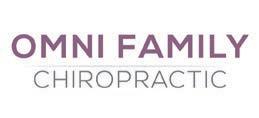
om We specialize in family-based wellness health care, focusing on correcting the structure of the spine and the function of the nervous system. Our goal is to help families live to their healthiest potential naturally. By addressing spinal alignment and nervous system health, we aim to enhance overall well-being and support longterm health!
WELLCOMEMD
2500 Gaskins Rd, Ste A 866-942-4522 · WellcomeMD.com infoRichmond@WellcomeMD.com

Experience concierge medicine with a functional medicine approach. Comprehensive and proactive, limited number of patients, unhurried 30-minute consultations for a personal and effective relationship with your physician. Schedule a discovery call today. See ad, page 19.
LINDA ZAFFRAM, LCSW, CYT200, PMH-C
Healing Circle Counseling 2819 N. Parham Road, Suite 130 Richmond, VA 23294
804-924-7600
HealingCircleCounseling.com

Linda Zaffram is the founder, owner and CEO of Healing Circle Counseling and Services. Linda’s areas of expertise include adults, women’s issues, depression, panic/ anxiety, PTSD, grief/bereavement, perinatal loss/stillbirth/miscarriage, perinatal mood disorders, maternal mental health, fertility/reproductive issues, NICU families, emotional, physical & sexual abuse, trauma, birth trauma, stress management, relationship issues, life transitions, communication skill building and developing coping skills.
CHERYL DESVERNINE
Braniac Wellness
804-250-3450
BraniacWellness.org

Cheryl is board-certified (BCN) in neurofeedback and has been practicing neurofeedback over the last eight years. We offer neurofeedback, eye movement therapy and traditional counseling to clients ages 6 and up. Neurofeedback is an intervention that improves symptoms associated with ADHD, anxiety, panic, PTSD, trauma, depression and more that is holistic and does not require medication.
NEIGHBORS AND HEROD FAMILY DENTISTRY
Dr. Brian Herod 1009 Crowder Dr., Midlothian, VA 23113 804-794-8745 • MidloDental.com

Dr. Brian Herod centers his holistic dentistry practice on the connection between oral and systemic health. He is a member of the IAOMT, providing an integrative approach to dental care. Safe amalgam removal, metal and BPA-free fillings, ceramic implants, biocompatibility testing, fluoridefree, 3-D cone beam.
NANCY A. POWELL, M.D.
River’s Way Healthcare of Virginia 5500 Monument Ave, Ste T 804-379-4560
RiversWayHealthcareVA.com
RiversWayVA@gmail.com
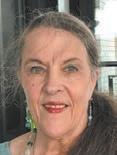
Offering expanded healing services. Providing traditional primary care and alternative approaches to support the body’s ability to heal itself. Extensive study in the mind-body connection to achieve optimal health. Certified by the Board of Family Medicine and by the American Board of Scientific Medical Intuition.
NAOMI IGUCHI, PHD, LCP, BCN, RYT NeuroFlow Wellness
804-349-3033
Naomi@NeuroFlowWellness.com
NeuroFlowWellness.com

Naomi is a Licensed Clinical Psychologist, Board-Certified in Neurofeedback, and a Registered Yoga Teacher who helps adults break free from cycles of chronic stress, anxiety, inattention, depression and exhaustion. Through her unique method, Embodied NeurofeedbackTM, she addresses struggles at their root—the brain, body, and nervous system—so change is fast, lasting, and medication-free. If you feel overwhelmed, disconnected, or trapped, her neuroscience- and research-backed approach offers a path to reclaim your calm, energy and joy.
REV. CHERYL FARE, MFA, LUT Certified Enneagram Coach
Ordained Unity Minister CherylFare.com
CherylFare@gmail.com 804-399-1527

The Enneagram is a dynamic system for personal, professional and spiritual growth. Working with an Enneagram Coach opens awareness around personality patterns, creates pathways for relationship connections, and empowers transformation for a happier and healthier life. Sessions available in-person or online. Learn more at CherylFare.com.
AMBER MANCHE, NP – CHRONIC PAIN & NEUROPATHY SPECIALIST Chronic Care of Richmond 8639 Mayland Dr. Ste. 105, Richmond, VA 23294 804-740-7105

Board-certified nurse practitioner and IFM member Amber specializes in treating chronic pain and peripheral neuropathy using non-surgical, root-cause therapies. Chronic pain is addressed with regenerative medicine like PRP, while neuropathy care includes advanced imaging and a multi-modal program. Every consultation includes a team-based approach with a chiropractor and case manager, integrating functional medicine, nutrition, and evidence-based care.
DR. MICHAEL WALD
The Blood Detective
4131 Croatan Rd. Richmond, VA 23235
914-552-1442
DrMichaelWald.com
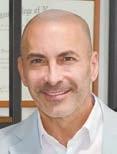
Dr. Michael Wald, known as the Blood Detective, has been in clinical holistic practice for 33 years. Using his Blood Detective Method & software, he analyzes extensive lab data to uncover causes of disease. Dr. Wald offers specialized lab work, targeted nutrition, and lifestyle guidance. He provides lab testing from all areas of medicine at once to ensure a comprehensive health evaluation. The Blood Detective Method allows for targeted natural approaches to optimize health and address chronic conditions. He is also the author of the Anti-Aging Encyclopedia. Dr. Wald’s expertise helps patients take control of their health by identifying hidden imbalances and offering personalized solutions for longterm wellness. See ad, page 6.
VERA DUBOVOY, M.D.
Dubovoy Integrative Health 1404 Starling Dr., Richmond, VA 23229 (Inside the Wellness Village) 757-603-3034
VAIntegrativeHealth.com
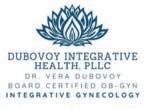
Vera Dubovoy, M.D., is dual board-certified in OB-GYN and Lifestyle Medicine. She has over 1,000 hours of training in integrative medicine and functional medicine including health and wellness coaching, nutrition, and herbal medicine. She believes in personalized wellness and nourishing our physical, emotional and spiritual health. She and her husband offer a range of progressive therapies designed to fit the treatment needs of the patient.
PCM INSURANCE AGENCY
Patricia Mayfield
PCMInsurance19@gmail.com 1-800-674-6771

PCM Insurance is your premier destination for Medicare enrollment services. With decades of experience in the industry, our dedicated team of experts is committed to helping individuals navigate the complexities of Medicare with ease. See ad, page 17.
ESCAPE MASSAGE
15500 WC Commons Way, Midlothian 804-794-0445
EscapeMassage.com
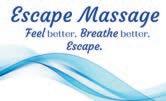
We offer a variety of massages including Swedish, Therapeutic Swedish, Deep Tissue, Hot Stone, Aromatherapy and CBD. We also offer energy therapy, reiki and halotherapy services. We have a team of professional, experienced, and caring licensed massage therapists and reiki masters ready to cater to your self-care needs.
NARITA C. SNEAD, MPH, MSN, APN-BC
Certified Medical Cannabis Provider
Adult Nurse Practitioner
Registered Practitioner for Medical Cannabis
804-475-8904
Green-Healing.co

At GreenHealing, we strive to make the process of obtaining a medical marijuana card and locating certified cannabis physicians as easy as possible for our patients.
MAGNOLIA WELLNESS
Regina Rudolph MagnoliaWell@gmail.com
804-495-0325
Wellness-Teas.com
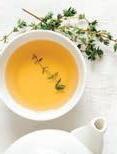
Promoting self-care and disease prevention through the use of our crafted collection of premium wellness teas designed to reduce stress and anxiety, strengthen the immune system, promote weight loss and release harmful toxins. Magnolia Wellness also assists people on their journey to better health and wellness through classes and private sessions. See ad, page 21.
DR. MICAH ALLEN, ND, LAC, FABORM
Essential Natural Health
804-464-3315
DrMicahAllen.com
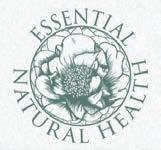
Dedicated to providing personalized holistic healthcare solutions in Richmond, Virginia. Our practice focuses on integrating time-tested acupuncture techniques with innovative medical
solutions to achieve significant and enduring results for our patients. Specializing in challenging chronic conditions such as peripheral neuropathy, infertility and pain, we strive to help individuals live fulfilling lives. At Essential Natural Health, we prioritize understanding each patient as a whole person. We develop customized preventive and natural medicine health plans for all ages, from pediatrics to geriatrics. Our approach is grounded in harnessing the body’s inherent healing abilities through tailored treatment plans designed to address individual needs effectively.
RX3 COMPOUNDING PHARMACY
12230 Ironbridge Rd, Ste C, Chester 11934 W Broad St, Henrico Ph: 804-717-5000, Fax: 804-717-8300
Rx3Pharmacy.com

RX3, Virginia’s First Nationally Accredited Compounding Phar macy, has been an industry leader for 23+ years. Specialists in customized compounding, bio-identical hormones, veterinary/equine compounding, traditional pharmacy, palliative care, professional quality supplements, CBD experts, Food Inflammation Testing, and more. See ad, page 2.
DEBBIE TROXELL, RN, MSNH Thermographer
The Wellness Village 1404 Starling Dr, Richmond 804-683-7774
RVAThermography.com
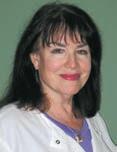
Safe, non-invasive, radiationfree imaging. Preserve your breasts, heart health and much more. Live happier and healthier longer! Interpreted by Matthew Lee, MD, RPh. See ad, page 26.
GLENMORE YOGA & WELLNESS CENTER Far West End Location 10442 Ridgefield Pkwy, Henrico 804-741-5267
Info@GlenmoreYoga.com
GlenmoreYoga.com
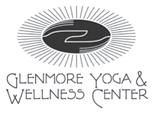
Incorporate yoga into your life at Glenmore with in-person and online student-focused, multilevel classes from Ageless Gentle, Beginner and Yin to Vinyasa Flow, Restorative and Meditation. 200- and 300Hour Teacher Training. Voted best Richmond Yoga Center.
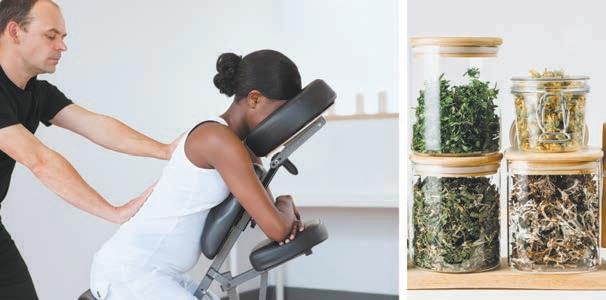

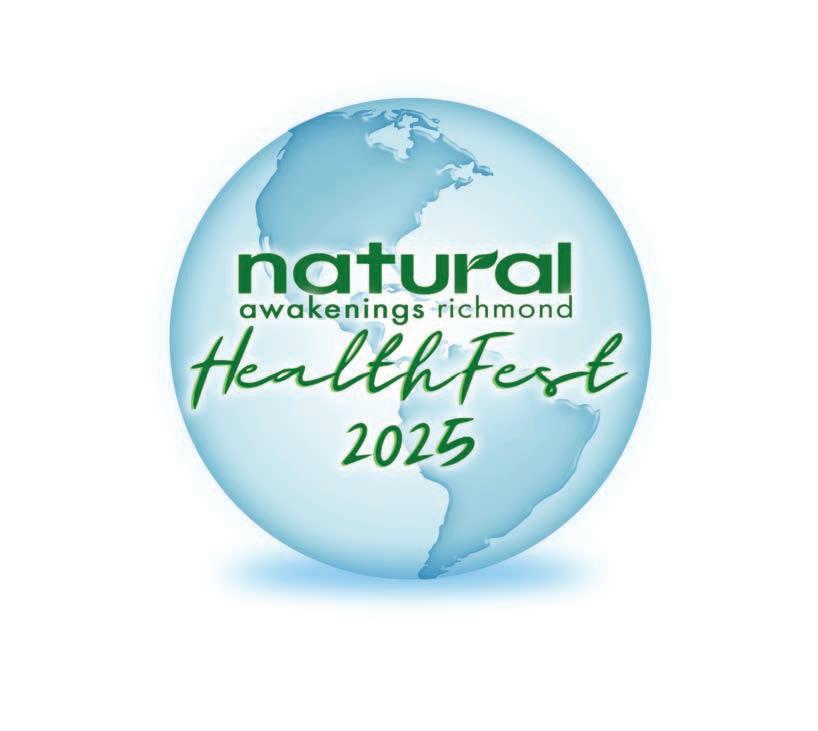
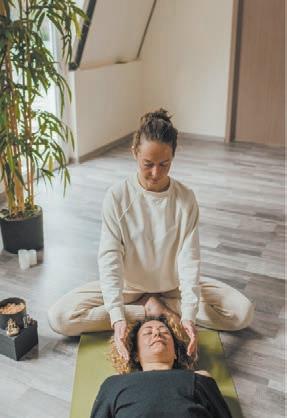

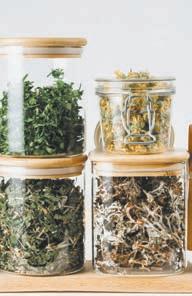
We are looking for:
• acupuncturists • yoga studios • fitness & wellness centers
• nutritional supplement providers
• herbalists, alternative medicine practitioners
• massage therapists • reiki masters • sports apparel companies
• natural skincare and beauty products
• eco-friendly and sustainable products
• spas • wellness retreat facilities • crystal providers
SECURE YOUR SPOT NOW WITH EARLY BIRD SPECIALS.
Location: Dewey Gottwald Center at Science Museum of Virginia
Date: October 11, 2025
Time:12-4pm
Learn more, visit NARichmond.com/pages/healthfest or email Regina@NARichmond.com